














I really enjoyed being a part of run crew for this show, there is a strong community among the members of stage crew. I love hearing the music from the sides of the auditorium especially the song "Heart to Heart".
Cate Siracusa runcrew, Class of '25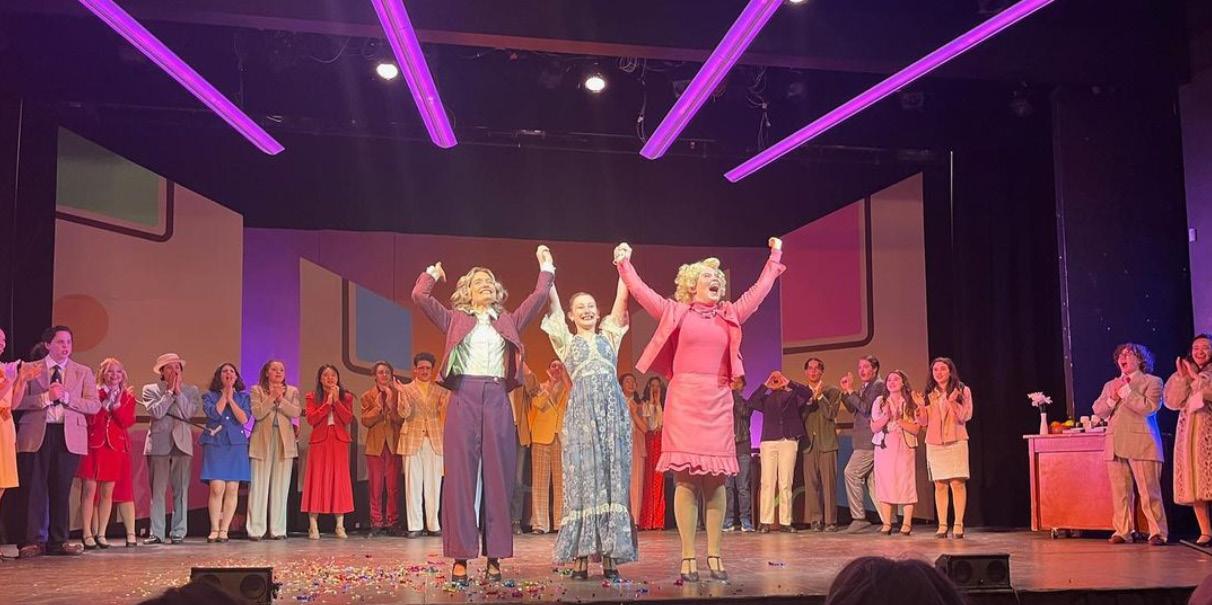
South Stage’s spring production, 9 to 5, the Musical, was performed on May 18, 19 and 20. e show follows three women, as they face their sexist work environment. Directed by Paige Perkinson, the musical consisted of 35 actors who rehearsed for two months leading up to the production. e music and lyrics of 9 to 5 were written by Dolly Parton and the show was based on the 20th-century Fox movie.
We are honored to have been selected by the City of Newton to install this system.
Nick Moore Project Manager with ACE Solar, at the ribbon cutting eventWe model and teach sustainable farming for the community. Running on solar allows us to reduce our carbon footprint further while stewarding this beautiful open space, the last working farm in Newton.
Sue Bottino Executive Director at Newton Community Farm, at the ribbon cutting event
On May 6, the Newton Community Farm completed the installation of solar panels on their south-facing barn. e solar panels were nalized in partnership with the city of Newton, the Newton Community Farm, Resonant Energy and ACE Solar. e installation is the result of many years of work, as discussions began back in 2019 with the intention to o set all of the Farm’s electrical needs by running solely on renewable energy.

I learned a lot from the upperclassmen and their experiences in South Stage. It was really insightful to learn from others' experiences.
David Rosenberg ensemble cast memeber, Class of '26On May 15, Governor Maura Healy announced that Worcester's former city manager Ed Augustus will be the next housing secretary of Massachusetts. Augustus’s appointment was met with mixed reviews as some believe that Augustus’s work in Worcester bene ted only the higher classes, while others argue that his experience is vital to address the current Massachusetts housing crisis.

He left Worcester a stronger city than it was a decade ago, with booming economic development in the downtown and thousands of new housing units.
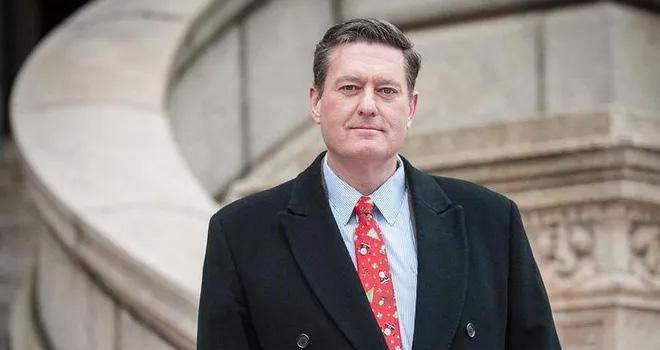 Maura Healy Governor via public statement
Maura Healy Governor via public statement
Your experiences in local and state government are vital for developing policies and supports to produce the homes that people and the Commonwealth need to thrive!
RachelHeller
of the Citizens’ Housing and Planning Association via Twitter
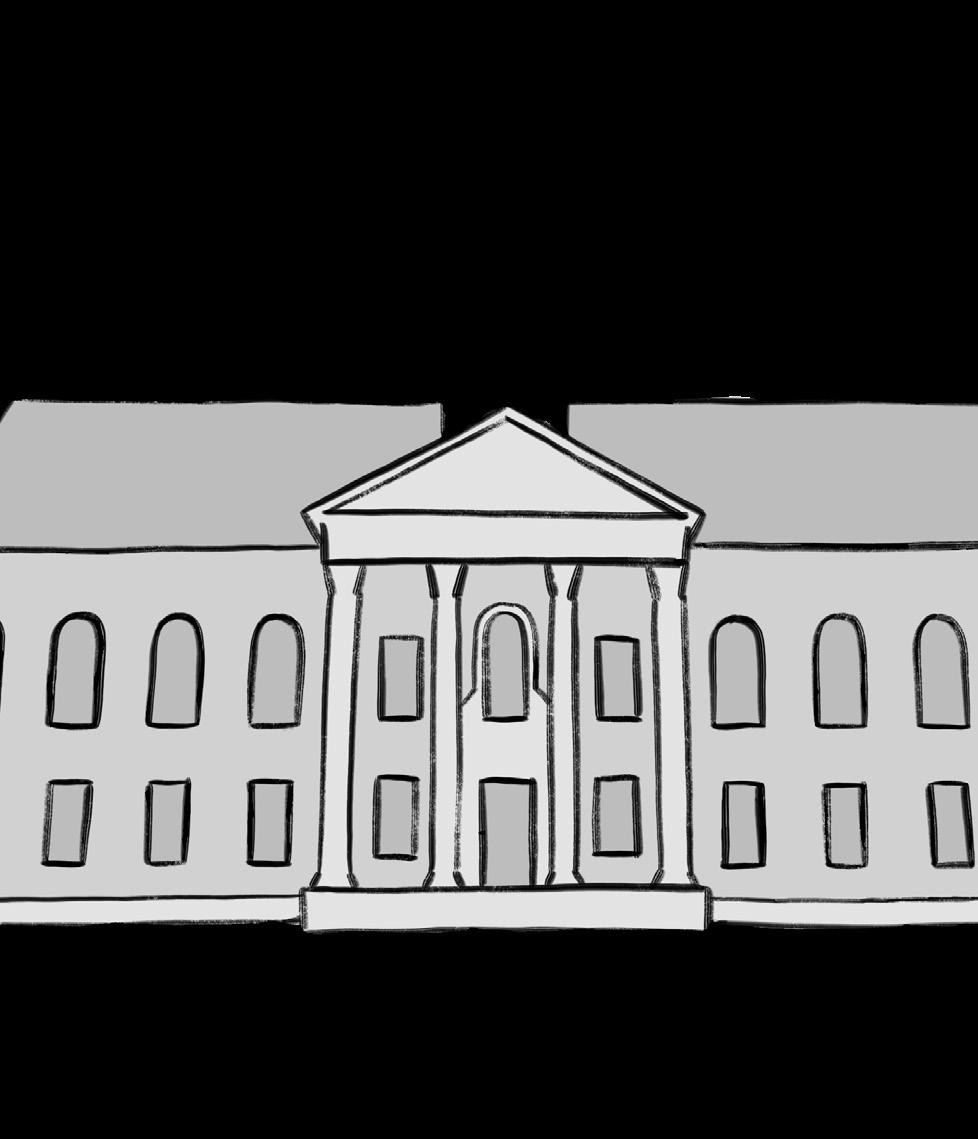 CEO
CEO
On April 23 and March 26, Ted Dalicandro and Talia Etedgee Brown were announced to take over as Cutler Dean and Fine and Performing Arts department head, respectively, at the start of next year.
Current special education teacher and head football coach Dalicandro has been at South for over 20 years and has been the football coach for the last 17 years. Dalicandro has been lling in as the dean of Wheeler house for Dr. Meaghan Martin, and he will remain in this position until the end of this school year.
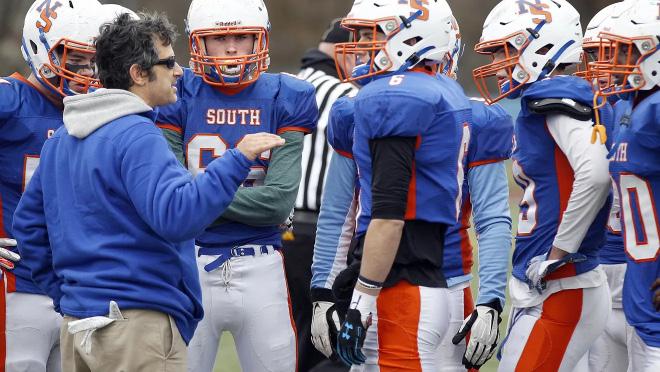
Dalicandro said he looks forward to working with and supporting Cutlerstudents as their new dean.
“Teenage students need a place where they can feel safe and comfortable to come to, and for me, high school is all about learning how to grow, and I want students to feel like they have a champion in me and know that I'll be supportive,” he said. “I'll do everything I can to make them feel successful and safe here.”
Dalicandro said that he embraces the notion that success takes various forms for different individuals and wants to help students embrace di erent kinds of goals.
“Success means one thousand di erent things to one thousand di erent students and I want students to feel that their level of success is still great,” he said. “ ey should feel good about themselves when they achieve what they want to achieve.”
In order to overcome South’s academi-
cally competitive atmosphere, Dalicandro said he hopes to encourage students to explore their interests beyond the con nes of a curriculum and to look past their grades.
“We are more than what our grades tell us we are,” he said.“It's okay to struggle, it's okay to fail at something, and failures are nothing but lessons. So if you fail, it's just a lesson, learn from that and move on and get better.”
Senior Jisun Yoon says she hopes the new Cutler dean will be easy to contact and happy to help students that need it.
“ ey need to be really open to students, and they need to embrace the diversity in our school. ey need to be ready to reach out to the students who need help because, from my experience with my dean, it felt kind of restricted to talk to her,” she said. “When I think of a dean, they're kind of hard to reach out to. Some deans are very open, and they're very friendly and really nice to talk to, but a lot of the deans are very formal, and they're always in their o ce, so I feel like they should be more open to students.”
In addition to a new Cutler dean, Talia Etedgee Brown will be taking over as the Fine

and Performing Arts department head. Brown is currently a theater teacher and the supervisor of Fine Arts at Orchard Gardens, an elementary school in Roxbury, MA.
Visual arts teacher Amy Nichols said that the entire art department works closely with the department head and that with the incoming position change, she said she hopes that Brown will rst get to know the teachers’ methods before implementing changes.
“I’m sure she has a vision for the art department and I’m interested and excited to hear what that vision is, but I hope that she'll see what's here before she tries to change it.”
Freshman class o cer and member of South’s choir Aleeza Amitan said that she hopes Brown will help to solve the music department’s sta ng issue.
“Something that's necessary is hiring more teachers for the music department speci cally because there are a lot of music classes and there is talk about how they stopped doing some because there are not enough teachers,” she said.
Senior and artist Jisun Yoon said that improvements can be made in the supply of materials in the classroom.
“From my high school experience, we lacked materials and the art teachers were challenged to be on the budget,” she said. “I hope the new art department head could gure out that issue with the district.”
Nichols said she hopes that Brown will encourage her teaching by preserving South’s positive learning environment.
“One of the things that make me want to come to work every day is that I'm with a bunch of people who can nd something funny every day,” Nichols said.“So we have our frustration[s]…, but there's a general sense of joy here and that's really valuable.”
Newton Public Schools (NPS) is pro jected to have a $4.9 million budget gap for the coming school year. To address this, the City of Newton proposed a tax override vote in March that would have provided more funding for the school system by raising property taxes above the state limit of 2.5%.
Ultimately, Question One was rejected, prompting NPS to cut its expenses.
Math and physics teacher Ryan Normandin said that the necessary cuts have been coming for a long time. As a result of contracts enacted 20 years ago, new projects such as rebuilding of schools were implemented and caused Newton’s costs to rise under the as sumption that the city would source of funding.
“We've created a structural de the City of Newton doesn't have the money because it is not raising the revenue to pay for all of its costs,” he said.
Principal Tamara Stras said that the student to teacher ratio will grow larger due to these budget issues and the impossibility of hiring more faculty.
“Enrollment is actually increasing, which should mean that we get additional teachers to teach the kids who are coming here, but the school system itself doesn't have the money to sustain all the positions that we need,” she said.
Special education teacher Kate Nardell said that students may to get individual support as teachers and programs are cut.
“Teachers who manage special education
students will have increased work,” she said. “A service provider may be spread across multiple schools instead of being based in one school… the amount of aid and support a student receives with mental health post-pandemic.
“After a pandemic when students are struggling more with mental health than they
have probably at any time in modern history,” he said. “We're cutting mental health support. It boggles the mind.”
Extracurriculars are threatened as well, said.
e money that the program does receive from the school usually goes to hiring

directors and artists. South Stage technical director Ryan Spruck said that these stipends are vital to the program.
“Right now we are able to attract some really top notch talent to come in and work with our students and give them a variety of people to direct them, help design shows and work with them,” he said.“If we're o ering them less money, arguably we'll get people who are not as experienced and maybe not as good.”
Cassell predicts that the budget cuts would also have an impact on other student
“Sports that are really expensive might have to be cut. For example, we might not run a freshman team,” she said. “Clubs might not er as many stipends for teachers, so that might mean fewer clubs.”
Although the override has already been rejected, Normandin said that even students who can’t vote can still take an active role in advocating for their education.
“When students speak, people listen,” ey should organize on things that they care about. It's good practice for the real world in which hopefully they will continue to be active citizens.”
We know we're going to lose some of our really good colleauges who , because they're the most recent hire, rst ones to get cut.
South data analyst and scheduler
We are more than what our grades tell us we are. It's okay to struggle, it's okay to fail at something, and failures are nothing but lessons.
Ted Delicandro Cutler house deangraphicbyLynnKim
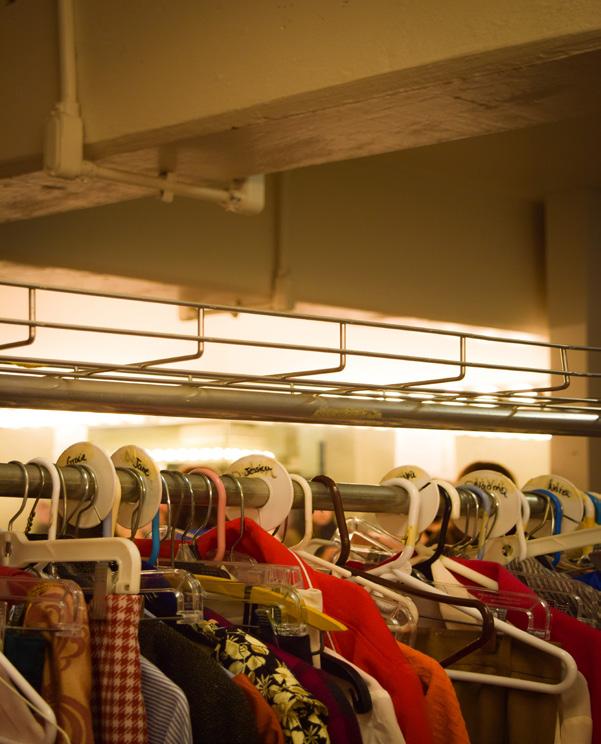
Behind the scenes of South Stage's spring play 9 to 5: the musical as the cast prepared to take the stage on May 18, 19 and 20. Scan for more photos!

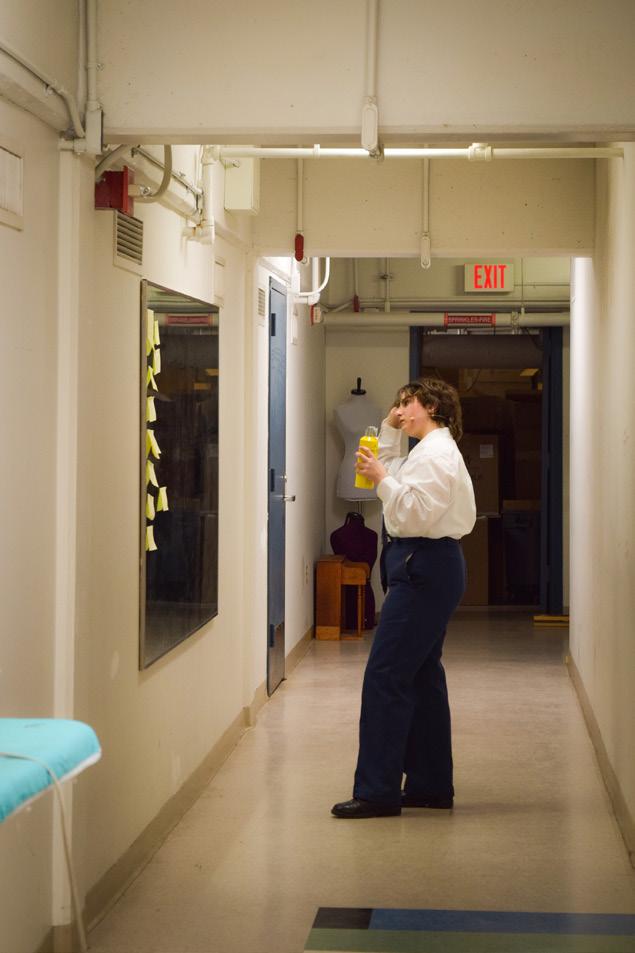

On April 14, Newton North hosted a drag show featuring drag performer Missy Steak as part of ToBeGlad Day, North’s celebratory queer awareness event.
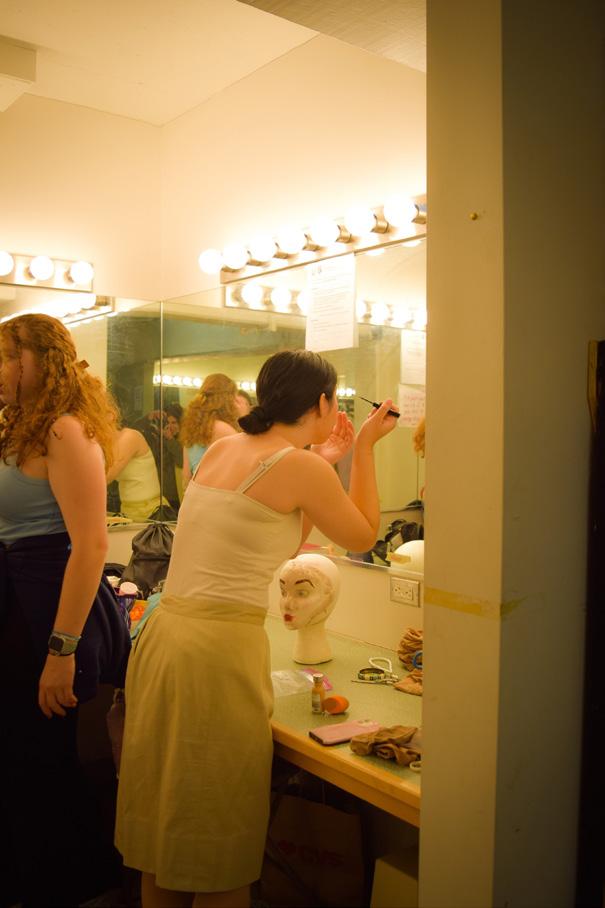
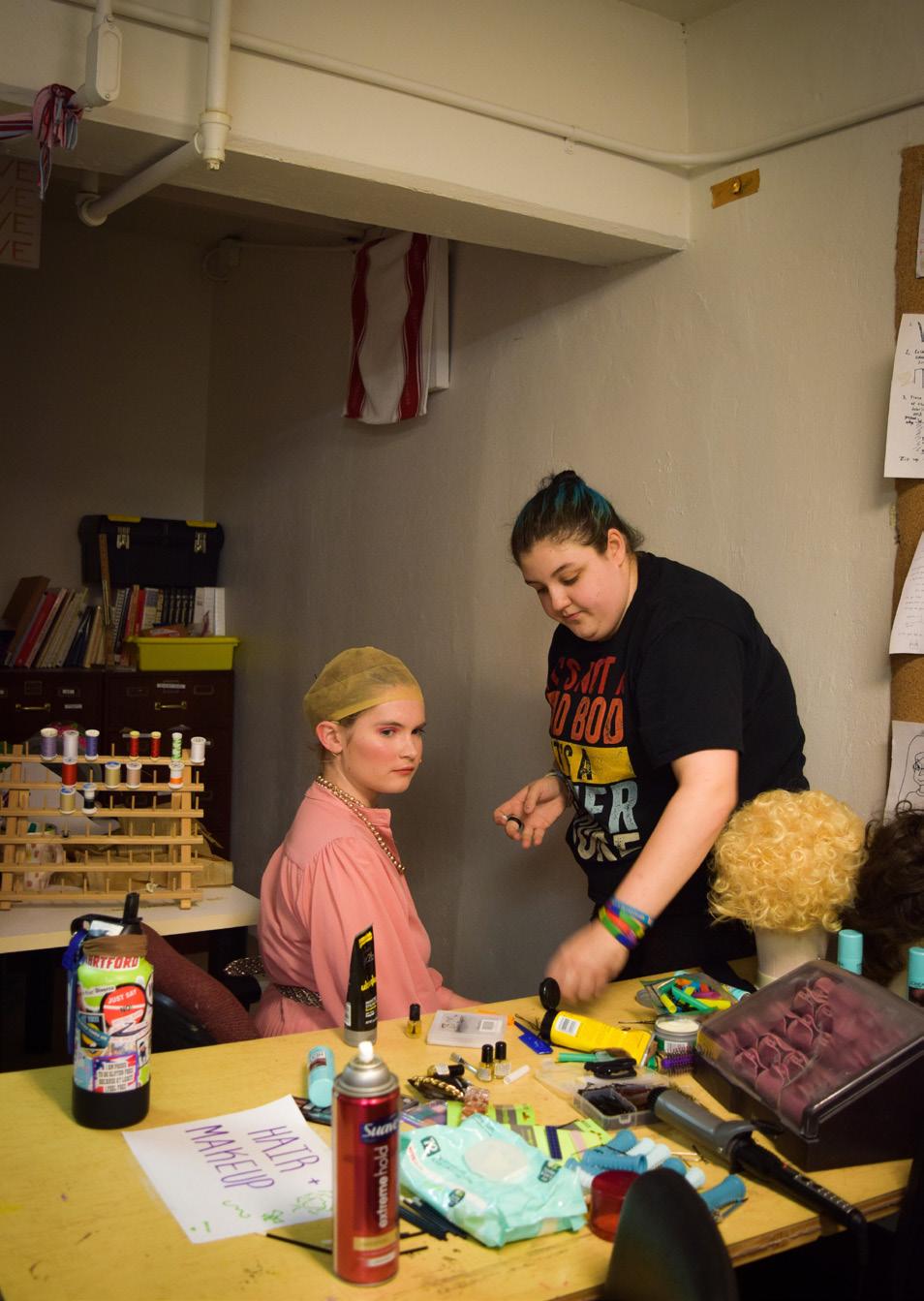
Following the show’s announcement, a Facebook post called for a protest against the performance; the protest was held in Newton Centre on April 13. Protesters said that a drag performance was too sexual to be done in a high school, while a larger group of counterprotesters were also present in support of ToBeGlad Day.
ToBeGlad Day features a series of presentations and events organized by North’s Gender and Sexuality Awareness Club (GSA), which has been running at North for over 20 years.
GSA o cer and North freshman, Wren Dunkailo-Minehart helped host this year’s ToBeGlad Day and said that its signi cance to the student body is profound.
students because it shows them that there are more people like them, especially if they're closeted,” they said.“It is also important to cisgender heterosexual students to bring awareness about this and to help combat queerphobia.”
However, North parent Henry Barbaro, an April 13th protester, said that the event would be inappropriate for high-schoolers.
“I just think it’s not age-appropriate, you know, it is adult entertainment,” he said. “Do other things, more age-appropriate, less sexual.”
Barbaro said that the performance required parents to make uncomfortable decisions.
“If it were up to me, I would say,‘Don’t do this event,’” he said in an interview with NBC10 Boston. “ is performance is really forcing the hand of parents to either do this draconian prohibition or say to their kids, ‘Alright, you can go,’ and hope for the best."
Protestor Svetlana Shaknovich said she feels that there are more important things for students to spend time on in school than watching a drag performance.
“I don't think drag shows should be demonstrated at the school,” she said to NBC10 Boston. “ ere are places for that and school is a place for more useful subjects, like physics, math and history.”
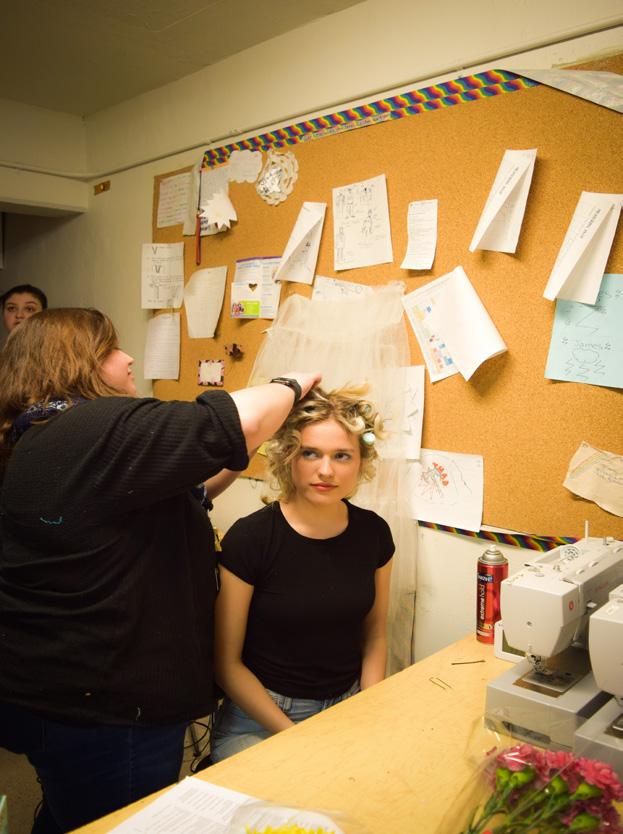
South GSA faculty advisor and history teacher Jenni Bement said that drag is often misconstrued as something dangerous and inappropriate.

“The fear among people that don't understand drag is that drag is inherently inappropriate, or inherently scandalous in some way, and that's not true,” Bement said. “ at's a misconception, which is why people run with that, like, oh, this isn't appropriate for school-age kids.”
Meanwhile, Steak said that drag has existed in di erent forms throughout history,
though it has often been misunderstood.
“There's Robin Williams and Mrs. Doubt re. It's gone back since Shakespeare,” she said.“I wish that people would just confront what they're really angry about because it seems a little baseless.”
After watching the performance, North sophomore Canina Wang said the assumptions made during the protests were erroneous.
“It was de nitely not anything like what people at the protest thought it was going to be like,” she said.“She just came and she sang a song and she danced. I thought it was pretty cool.”
In response to the Newton Centre protest, more than 100 Newton residents and community members gathered to show their support for the drag show.
North Principal Henry Turner said he was impressed with the turnout.
“What was really amazing about the day
was the range of students who participated,” he said. “ e counter-protest was chock full of people from di erent backgrounds who support the idea of bringing in an array of di erent ideas into our school.”
Despite the resulting con ict, Steak said she feels that the community handled it well.
“I felt safe. I felt supported. I've met with lots of the sta and faculty who seemed like they really were grateful I was there,” she said. “I'm very grateful for what Newton did.”
Bement said that throughout the controversy, North was not only supportive of the performer, but also of Newton’s students.
“I’m sure that it was very empowering for LGBT+ students,” Bement said.“I think [that keeping the performance] was the right thing to do. We can't let prejudiced people dictate school event policy.”
“[ToBeGlad Day is] important to queer
I felt supported. I've met with lots of the sta and faculty who seemed like they really were grateful I was there, I'm very grateful for what Newton did.
Missy Steak Drag performerSupporters of the drag show gather in Newton Centre photos by Bella Ishanyan
Aer 24 years at South, English teacher Dana Arnaboldi is retiring from teaching.
During her time at South, she was a faculty advisor for South’s yearbook Regulus as well as the advisor of Raise a Smile, a community service club that supports disadvantaged children.
Arnaboldi said that the most rewarding part of her job was supporting her students both inside and outside of the classroom.
“I love getting to know my students as people, while watching them grow as learners,” she said. “It's amazing when you can when both of those things can happen at once.”
English teacher Robyn Marder rst met Arnaboldi over 20 years ago while getting her teaching certi cation. After becoming colleagues two years later, they became close friends. Marder said that Arnaboldi has always been a cheerleader for her students.
“She's so adept at and willing to modify things and see what an individual student needs and she always nds a way to give it to them.” she said.
Although Arnaboldi doesn't yet have plans for after retirement, she said she is ready to explore what her future entails.
“I'm keeping my options open,” she said. “I am excited about having new adventures.”
Biology teacher and co-founder of the DaVinci program Linda Kraus is retiring from teaching at South a er 25 years.
Math department head and Dr. Kraus’s son Alex Kraus said that Dr. Kraus made integral contributions to prominent clubs at South.
“She was very instrumental in the start of our science team here and really getting it o the ground. e robotics team as well, which didn't exist here at all, went on to win awards in its very rst year of inception,” he said.
Mr. Kraus said that he has appreciated sharing a working environment with Dr. Kraus.
Aer 27 years of contributions to the School Council, art festivals and advising a multitude of clubs, including the United Nations Children’s Fund and the Jewish Student Union, history teacher Dr. Marcia Okun is retiring this year.
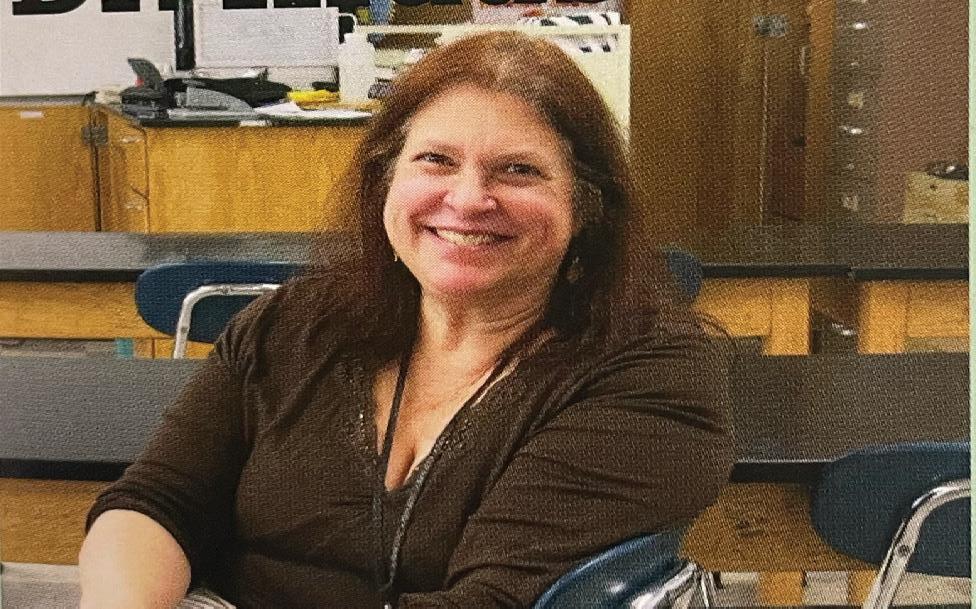
A South alumna, Okun said that she discovered a job position from an acquaintance and has been teaching ever since.
“I'd gone to South as a student, and somebody suggested I try teaching,” she said. “I talked to one of my former teachers and there was an opening for a long-term substitute.”
History department head Jennifer Morrill said that Okun made a lasting impact on South’s curriculum.
“She has given the history department so many recom-
mendations for readings, books and scholarships that have really impacted how we teach history,” she said. “She's been instrumental in helping all of us access new scholarships and think of ways to use it in our courses.”
With retirement approaching, Okun said that ultimately, teaching has been rewarding.
“Seeing students grow and learn to think for themselves is incredible,” she said. “Knowing that I made a di erence is very satisfying.”
Morrill said Okun’s intelligence and curiosity will continue to inspire outside of the classroom.
“I know that she will continue to engage with ideas, think deeply about the world and teach in her own ways.”
History teacher Lisa Soo Hoo has taught at South for 25 years. is year, she is retiring from teaching along with co-advising the Asian Student Organization (ASO).
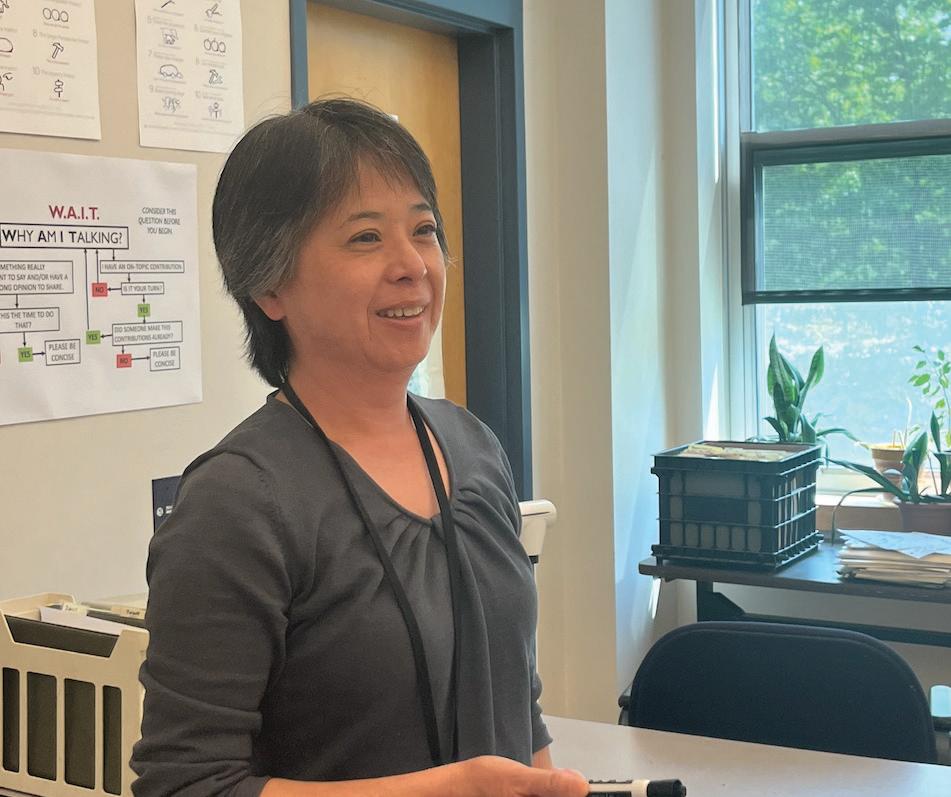
Soo Hoo said that she especially enjoyed watching students progress and gain both scholarly and interpersonal skills.
“I enjoyed the daily work with students, helping them to problem solve [and] guiding them to be better thinkers, teammates and humans,” she said.
Co-advisor of the ASO with Soo Hoo, chemistry teacher Suzy Drurey said that students and sta are fortunate to bene t from her inclusive vision.
“She has impacted positive change in South's student
Aer retiring in 2018 and coming back in 2022, Spanish teacher Marla Wiener has decided to retire from teaching at South a er 28 years.
roughout her time at South, Wiener spent many years developing the Individual Senior Experience program (WISE), a program in which seniors can do various projects and internships outside of school while still receiving school credit.
Wiener said she wanted the program to be a space where students could nd joy in things outside of the basic core subjects.
“If they feel good about themselves in the classroom and feel good that they’ve accomplished something, that’s the most important thing,” she said.
World language department head Suzanne MurphyFerguson said Wiener’s passion and perseverance have allowed her to improve her students’ learning mindset.
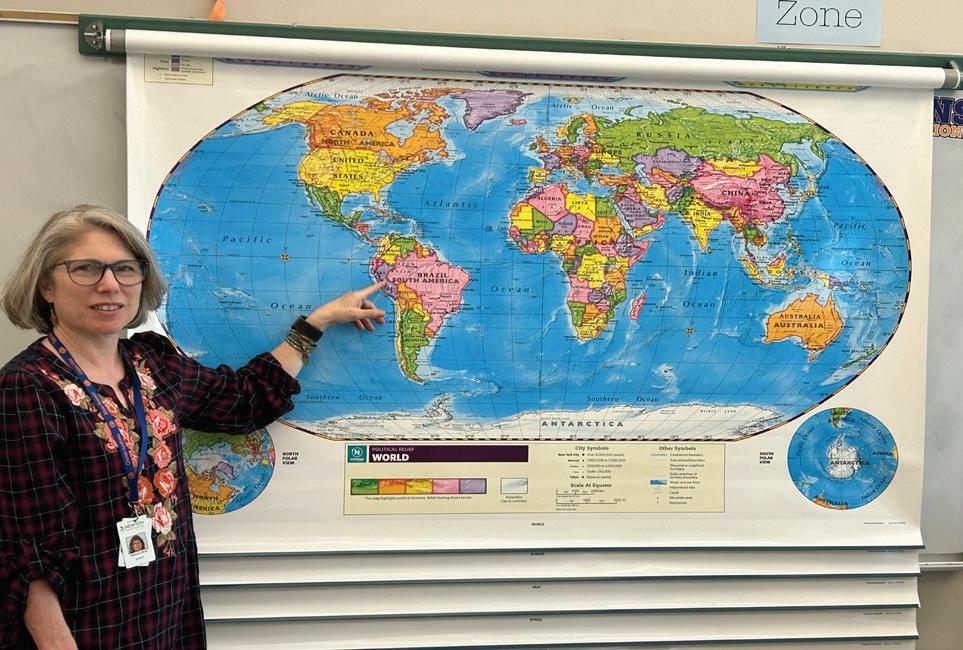
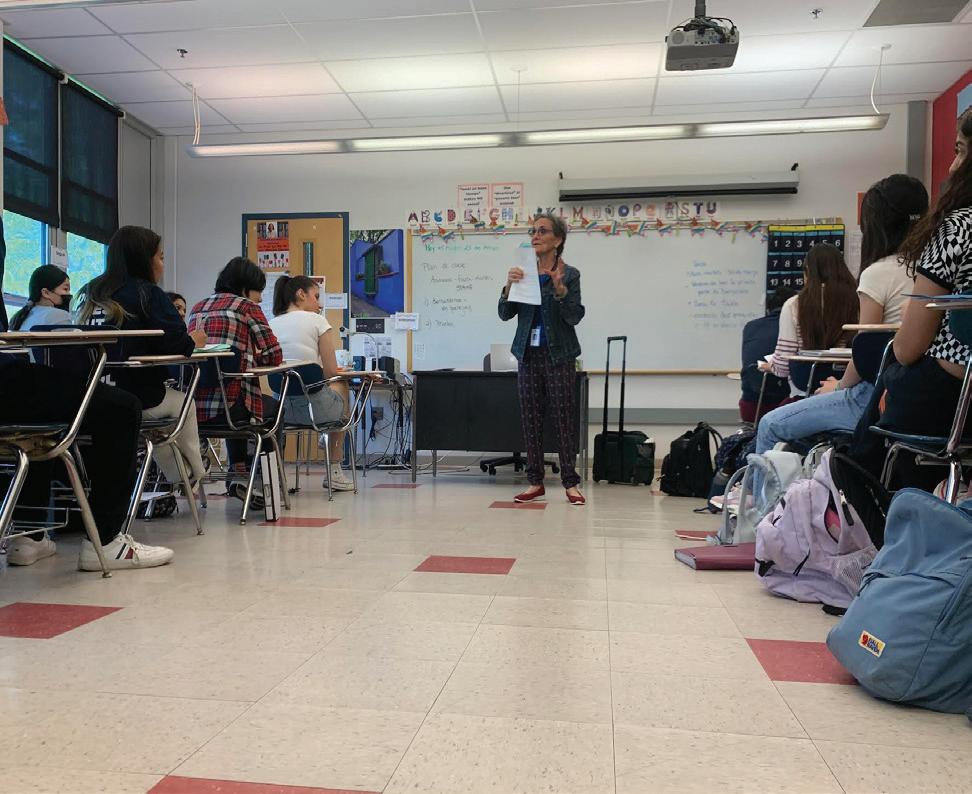
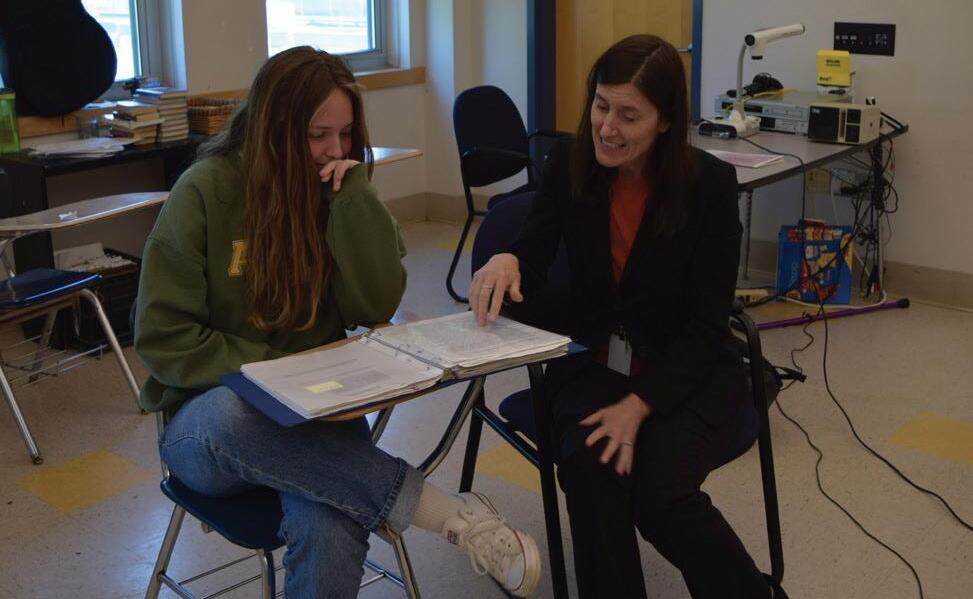
“She helped shape our world language program and get students excited about being able to speak another language and use it beyond South,” she said. “She really does help every student see their way through the end of whatever it is they're working on.”
Murphy-Ferguson said Wiener’s recracker-like energy is contagious.
“She is small in stature but huge in energy,” she said. “You will sense her energy. You will see she's somebody who is always vibrant in her colors and I think that vibrancy is just an entire part of her persona.”
Before retiring, Wiener said she wishes the best for her students.
“I want to be remembered as someone who cared dearly about her students,” she said. ”If kids can achieve something that they feel good about, that’s the most important thing to me.”
“I'm very glad to be able to celebrate her contributions to South, certainly as a colleague, but more as a son,” he said. “She created an environment in which students could feel safe, connected, involved, respected and appreciated.”
As an educator himself, Mr. Kraus said he was fortunate to have a role model like Dr. Kraus.
“I had one of the best possible mentors I could ask for, and she was my mom,” he said. “I am hopeful that in retirement she continues to nd as much ful llment and satisfaction and joy, working in and doing whatever she chooses to do, as she did working with the students here at South because I know that is something that she truly, truly loved.”
culture and instilled social activism, social justice and anti-racism policy at our core,” she said.
Close friend and co-worker Lily Eng Shine said that she admires Soo Hoo’s humility.
“She's someone who works hard and actually doesn't need the credit,” she said. “It's enough for her to know that she's making a change and I really respect her for that.”
After retiring, Soo Hoo said she plans to keep busy with meaningful contributions to her community.
“I plan to further my involvement in sustainable agriculture and gardening,” she said.
“Maybe work for a non-pro t and hopefully travel and read more.”
All high school students remember the experience of “going to school” during the height of the COVID-19 pandemic. Sleeping through morning classes on Zoom, completing asynchronous classwork and eventually making the transition to the hybrid model integrated into our routines.
It has been almost two years since schools reopened completely and we returned to our familiar normality before the infamous shutdown of March 2020.
On May 11, the Biden administration announced the expiration of the COVID-19 public health emergency. is just means that, there are now changes in the data the CDC collects and in health care coverage. COVID-19 is now o cially considered in the same category as other respiratory illnesses.
e public health emergency was rst announced in 2020 during the Trump administration, despite the former President’s claims that the virus was a “hoax”, crafted by the Democratic party to thwart his presidency.
is deeply polarizing rhetoric engulfed American media. During those three turbulent years, Americans were overwhelmed with constant clashes between their leaders and heated discourse playing out on the national stage.
Fueled by Trump’s narrative, the politicization of the virus and science in general, became incessantly more dangerous. It was
routine to hear about the latest disparagement the former President directed at doctors and medical professionals.
In an increasingly divided political climate, simple precautions one took to protect themselves became sources of hostility, to the
Yet, the world is seemingly making its natural return to the life we knew three years ago. e daily reminders of the virus’ daunting presence that were our “new normal”, such as masking at all times in public and diligently practicing social distancing, are part of a period
is impossible to forget the impacts the pandemic had.
Is the pandemic over? Technically speaking, yes. e government has announced the end of the COVID-19 emergency, masking in public places isn’t required anymore and the virus is not constantly at the forefront of most people’s minds, even though it very much still exists.
e most recent outbreak of the virus at South impacted South Stage during the production of the spring play 9 to 5: e Musical. Cast members and others involved were quarantined, a reminder that protocols have stayed relatively constant.
Despite the delays the virus caused, along with the lack of a director, the musical was put on as regularly planned. e cast rallied together to overcome their obstacles and continued the production themselves.
point where there were instances of people on both sides being attacked in public.
Simultaneously, hate crimes against the Asian American community skyrocketed due to Trump’s various racially charged comments about China, COVID-19’s country of origin.
As a country, we cannot fully return to pre-pandemic circumstances. e COVID-19 pandemic brought about a major cultural shift and deeply a ected the very fabric of America.
e Lion’s Roar, founded in 1984, is the student newspaper of Newton South High School, acting as a public forum for student views and attitudes.
e Lion’s Roar’s right to freedom of expression is protected by the Massachusetts Student Free Expression Law (Mass. Gen. Laws Ann. ch. 71, Section 82). All content decisions are made by student editors, and the content of e Lion’s Roar in no way re ects the o cial policy of Newton South, its faculty or its administration.
Editorials are the o cial opinion of e Lion’s Roar, while opinions and letters are the personal viewpoints of the writers and do not necessarily re ect the opinion of e Lion’s Roar e Lion’s Roar reserves the right to edit all submitted content, to reject advertising copy for resubmission of new copy that is deemed acceptable by student editors and to make decisions regarding the submission of letters to the editors, which are welcomed.
e Lion’s Roar is printed by Gannett and published every six weeks by Newton South students. All funding comes from advertisers and subscriptions.
In-school distribution of e Lion’s Roar is free, but each copy of the paper shall cost one dollar for each copy more than ten (10) that is taken by any individual or by many individuals on behalf of a single individual. Violation of this policy shall constitute theft.
e Lion's Roar reserves the right to publish all content on its website (nshslionsroar.com), social media channels and online viewer, Issuu.
we have put behind us.
Now, being required to quarantine for ve days seems to be more distressing and inconvenient than the worry of being severely ill from COVID during the peak of the pandemic.
It is a human truth that people are most personally a ected by something when it connects to them directly. For those who are at higher risk for COVID-19 due to pre-existing conditions or those who have lost a loved one, it
Even though the legacy of the pandemic will never truly go away, the repercussions are apparent in the changes to daily life, as well as the division across the political spectrum on the national level.
We cannot come back from the irreversible shift in the political climate. We now exist in a post-pandemic time: the new normal. With this newfound cultural transformation, we must restore unity in the United States and the entire world.
Newton South High School’s Student Newspaper
140 Brandeis Road Newton, MA 02459 ss.lionsroar@gmail.com
Editors-in-Chief
Bella Ishanyan Emma Zhang
Managing Editors
Grace Dempsey Risha Sinha
Section Editors
News
Andrew Feinberg
Irene Gonzalez de las Casas
Jenny Lee
Alex Zakuta
Features
Alyssa Chen
Ava Ransbotham
eo Younkin
Graphics

Denise Chan
Lynn Kim
Adrienne Lirio
Centerfold
Grace Sousa
John Timko
Pawdcast
Renee Lu Ashish UllhmanFaculty Advisor Ashley Chapman
Opinions
Eden Levitt-Horne
Jacob Lewis
Angela Tao
Sports
Joey Giragos
Julia Lee
Sarah Schwartz
Photos Evan Ng
Social Media
Levin Brenner
Tate Slater
e COVID-19 pandemic brought about a major cultural shift and deeply a ected the very fabric of America.

My great-uncle died 15 minutes ago.
As I write this, I feel pretty indi erent. I don’t feel happy — I’m not a sociopath — but I don’t feel sad: does that make me a monster?
When I found out from a text in a WhatsApp group chat, all I did was sigh and go wake up my mother to tell her the news.
Well, I didn’t even tell her the news myself. I’m far too emotionally chicken for that. I just told her to check her phone, saw that she understood, turned on my heel and tried to go back to the crossword I was writing. If any of the clues feel particularly macabre, I apologize.
I don’t know how to deal with death, especially the death of a stranger who I am expected to love because of our shared DNA. I don’t know how to love, nor do I know how to grieve (because what is grief if not love ongoing) someone who I am told I’ve met twice, but only remember meeting once. How do I miss a voice, a face, a personality I do not remember?
I remember my grandmother’s personality, though her face and voice escape me sometimes. Nothing makes me angrier than forgetting a voice I cherished every Sunday morning through the phone. A voice that embodied kindness, empathy and strength.
When she died, I was irate. First with myself, for not spending more time with her, for not relishing every last moment. en with Gods I don’t believe in, for taking her away
from us. e tears I tried so hard to hold back were hot and furious, but they disappeared too quickly.

In the past three years, I have become uncomfortably familiar with grieving relative strangers. First, my grandfather passed, and within the year, my grandmother. A great aunt, an aunt and now, a great uncle.
I don’t think I consciously loved any of them except my grandmother. How could I? I barely knew them.
Of course, I mourned the loss of human life, but maybe it was no di erent than the death of a favorite actor: the loss of a somewhat familiar, loved face that I ultimately had little personal connection with.
What allows me to live with myself (pun intended?) is the abstract idea of coping mechanisms: the idea that deep down, in my own screwed-up way, I do mourn.
e idea that I mourn because blood is indeed thicker than water, and laced in that blood are wisps of the love I am unable to express.
But I do love. I love my mother. I love my father. So when their faces contort with pain and their eyes glaze as death’s invisible hand closes its st around their hearts, I feel it too. I don’t grieve the loss of a loved one I knew intimately — I grieve my parents’ pain and my inability to relieve them of it.

And now back to our regularly scheduled nonsense:
Cramped in the third row of a minivan, knees crushed against the seat, 15 minutes into a two-hour road trip to go see Trevor Noah live, I felt like someone had infused my water with ecstasy.*
*For legal reasons, I am obligated to note that I have never tried ecstasy.

Two days prior, I was wallowing in misery, waxing poetic about how I felt like a monster. (Welcome to the Roar, where pain becomes print!)
In that car, ghting for airtime and legroom with four of my oldest friends, my heart felt like it had grown three sizes, and my grin stretched so far across my face that I must have seemed like the love-child of the Grinch and the Joker. I was the Grinker. See me in theaters, July 2047.
Joy is like a good pair of socks. Most of the time, you take it for granted. But if something is even slightly amiss, boy, do you know it.
My socks had been wet, but laughing with friends was like going through a dryer cycle: a reset to the warm, fuzzy goodness we all need.
We spent two hours quizzing each other on absurd trivia, gossiping about crushes and thinly veiling dirty jokes for the sake of my friend’s parents. It was so simple. I loved it.
It’s hard to describe how I felt that night.
It’s the same way I feel at the end of a rom-com when the hotties you knew were going to get together nally kiss.
It’s how I feel when I make someone I just met laugh. Or when I solve a math problem I’ve been stuck on forever (#nerdalert). Or when editors get their proofs in on time (cough cough).
Joy is mouthing the words to John Mulaney bits. Joy is listening to the old Simon & Garfunkel CD my mom played when taking me to daycare. Joy is, coincidently, my uncle’s name. My grandmother was joy.
During our weekly phone calls, she would ask endless questions about my life, laughing at my bad jokes.
We were an ocean apart, but I felt so close to her. I missed her call a couple days before she died. I hate myself for that.
If I could go back and pick up that call, I would tell my grandmother how much joy she brought me and every other life she touched.
Today, I asked my parents to buy almond cookies from H-Mart. I had forgotten that these were my grandmother’s favorites, the ones we would bring when visiting her in India. Remembering her through cookies was a beautiful surprise.
It is remarkable how the memory of someone who inadvertently caused so much grief can spark so much joy.

From April 28 to May 2, "The Cattle Car", Jewish nonprofit ShadowLight’s traveling Holocaust education exhibit was stationed in front of City Hall. Although the exhibit was designed to be in front of schools, NPS chose to offer highschoolers the option to visit the exhibit as a field trip.


Just past the manicured lawns and half- lled city hall parking lot, directly facing the dozen-odd steps leading up to its columned façade, sits a cart.
It’s small, less than a hundred square feet, and not much more than a worn, copperand-steel shell encasing dusty wood. Ladegew: 1500kg, reads the faded, painted-on German in the corner. Load weight: 1500 kilograms.
e cattle car stands out against Commonwealth Avenue’s serenity, almost as if an artist had dabbed, by mistake, a splotch of brown against the backdrop of groomed trees, blue skies and Ionic pillars.
My rst interaction with “ e Cattle Car” came before I saw it in Newton. e exhibit had propped up in Harvard Yard just a week earlier; walking by and glancing at the adjacent signs, my apprehension — or, maybe, discomfort? — beat out any curiosity. It wasn’t until it arrived in Newton that I convinced myself to go inside.
For me, Holocaust education never began or ended; it always was, a macabre constant within a Jewish identity that I never fully embraced.
Hearing about great uncles, great-grandparents or cousins who died or were enslaved by the Nazis isn’t a unique experience for a Jewish teen, let alone one who emigrated from Israel. Everyone has a relative who disappeared, or who died, or who remembers too much but won’t mention the camps unless prodded. e
Holocaust isn’t a single unit taught in sophomore history or an uncomfortable fact of the past, but a permanent patch on every family’s historical quilt.
Still, it’s easy to brush by it. Growing up in Newton, where one in three people are of Jewish descent and bar mitzvahs form a middle school staple, antisemitism and genocide feel like a world away.
It’s because of this privilege — because living in Newton allows me, as an American Jew, to often take my status for granted; because Newton, unlike so many other cities, enjoys such a vibrant and thriving Jewish population — that “ e Cattle Car” is so important.
I’ve never loved how we learn about the Holocaust in history classes.
Four years long, based on texts and materials from the Anti-Defamation League and the Holocaust Memorial Museum, and lled with both survivor accounts and historical analyses, Newton’s approach to teaching about the Holocaust seems ahead of the curve.
Even after Massachusetts began requiring genocide education in schools, something always felt detached, if not outright impersonal, lacking the visceral understanding and human experiences that make up the foundation of genocide’s horri c impact.
“ e Cattle Car” doesn’t shy away from the personal. Stepping inside a space smaller than a college dorm room yet meant to house over a hundred, it’s hard not to feel a
sense of vertigo.
The video exhibits projected onto the walls move from historical overviews to interviews with survivors, each recounting — sometimes stoically, sometimes emotionally, but always in vivid detail — how tight it was inside the cars, the cries for food or water that eventually tapered o and the stench of death that slowly circulated.

Tucked into the corner of the car, past a crack in the wooden façade where a single stream of light can get in, are a child’s footprints. e children forced into the cattle cars — with or without their parents, crushed against hundreds of others, perhaps unaware that they sat mere days away from annihilation — is a number lost to any textbook or lesson plan.
But standing there, seeing even the barest of physical monuments to the experiences of those children lost, forever, to the Holocaust, felt more moving — more real — than any number of classroom discussions.
It is through this unrelenting willingness to impart to visitors even a fraction of the actual feeling of being in the cattle car — creating a physical representation of the space, shutting the doors, enveloping those inside with detailed recollection — that “ e Cattle Car” makes a far more important statement on how we must approach the Holocaust and other genocides in the classroom: that there is no education without experience.
e impacts of the Holocaust, as with
any genocide, cannot be replicated. Yet, “ e Cattle Car” shows that we cannot take that fact and use it as an excuse to wall ourselves o , to con ne such vital education just to lectures or documentaries in the classroom.
Living in Newton, brushing off the importance of complementing standard classroom education on the Holocaust with ungarnished reminders of its brutality can be easy; after all, Newton chose to place“ e Cattle Car” in front of city hall even as universities like Harvard, public schools in Brookline and even the original car in Canada all brought the exhibit to school campuses.
Seeing the car in public can be a jarring experience, even more so after learning about its meaning. But to dismiss it as unnecessary or heed to fears that it may be inappropriate only continues to brush its message under the rug.
It insulates students from immersing themselves, even temporarily, into what it really means to be brutally, mechanically dehumanized — into what genocide really represents.
What “ e Cattle Car” represents at its core is the sheer strength of stepping back into the past, even for a moment, and understanding how crushing genocide can really be: no victim of the Holocaust had the luxury of opting out, of closing their eyes in the face of pure evil. e longer we sit in our bubbles, and the further we get from the Holocaust’s horror, the harder it is to remember what it really means to “never forget.”

 By Eden Levitt-Horne &
By Eden Levitt-Horne &
With US politics often playing out with more lies, melodrama and surprise reveals than an episode of e Kardashians, the national media has plenty of material to cover.
Even as political Tiktok in uencers and Youtube channels become more mainstream, cable news remains a staple of American culture.
To compete with the shorter-form content and capture viewers, however, media personalities rely on their brands as ultimate authorities to monopolize accuracy and create cult-like followings.
In an increasingly saturated media climate, socio-political commentator Tucker Carlson rose to fame by validating conservatives’ fear on his Fox News show, Tucker Carlson Tonight.
To retain viewers, he used a vicious cycle of fear-mongering through rhetorical lines of questioning and selective reporting of events.
Following Putin’s invasion of Ukraine, Carlson constructed a attering narrative for the dictator commended by the Kremlin.
Rather than addressing the active invasion of a neighboring country, Carl-


if Putin was making fentanyl or trying to snu out Christianity in a false comparison to other world leaders.
Carlson sowed seeds of distrust of other news outlets.
By telling his viewers that his skewed version of events was the only truth and labeling those who called him out or corrected him as vindictive liars and enemies of conservative media, he monopolized the legitimacy of news.
During the golden era of Trumpism, Carlson capitalized on the opportunity of building a brand from previously fringe voices, propelled and emboldened by the shifting Overton window, the range of ideas deemed acceptable by the general public.
With over three million viewers tuning in each night, it became the highest-rated primetime program and in turn, Carlson became the face of conservative “reporting”.
Until, of course, Carlson lost his


8-p.m. slot, following Dominion Voting System’s defamation lawsuit against Fox News.

e lawsuit culminated in a 787.5 million dollar settlement and Carlson’s abrupt departure from the network.
When Fox announced Carlson’s discharge, shock echoed across the political spectrum.
But the de ning image Tucker Carlson presented to his viewers was beginning to fade even before his ring. As part of Dominion’s lawsuit, several of Carlson’s text exchanges were made public, including multiple messages in which he was critical of the former president he adulated on air.
“We are very, very close to being able to ignore Trump most nights, I truly can’t wait,” Carlson wrote to a Fox employee.

Concerning the stolen election lies he staunchly defended when the cameras were rolling, Carlson told a Fox executive producer
that Trump’s lawyer and the largest perpetrator of election lies, “Sidney Powell, is lying.” Carlson had three million nightly viewers, but in them, he also had three million loyal consumers paying for cable and watching ads each night, reigning in massive pro ts. He understood the performativity behind the sea of misinformation he spewed to millions.
Radical media generates vastly more revenue due to its dedicated fanbase devoting more money and time to the outlet. e pro t motive leads many media companies to prioritize ensnaring an audience over factual, quality reporting.



Carlson crossed the line between entertainment and news by valuing sensationalism over legitimacy.
Perhaps one of the most devastating occurrences in America in the past few decades has been the failure of the American media. e media progressively overemphasized an “us vs them” mentality — one that has ignited mass polarization and even violence throughout the country.
Because of this, it is vital to understand the external influences on the media and process they might be instories you read.

Over the past three years, 1088 seniors have shared their college plans with us. Here, we have (painstakingly) compiled a visual breakdown of where those seniors went.

Once upon a time, I embarked on the perilous journey to become a camp counselorin-training. To be frank, I was astronomically unprepared. Somehow I didn’t expect that young children would not, in fact, be eager to do activities with any hint of structure.
Branches at Meadowbrook Summer Camp was sweltering, and between the heat and the humidity, it seemed as if my bones were melting. Clearly, no one shared my pain, for the air was lled with the eager chatter of children and counselors alike.
One day, a girl in my group suddenly ran o toward the swamp for nature classes. I immediately took o after her with the noble, though ill-planned, intention of preventing any accidents.
Unfortunately, in my haste to stop disaster before it struck, I created one myself: tripping and diving into the soft mud on the edge of the swamp. It felt like being thrown into a Net ix romantic-comedy starring a clumsy heroine, only instead of being caught by my very own popular, teen love interest, I just faceplanted into the mud.
Needless to say, the other children found this very amusing, and my unfortunate mishap soon became a way for counselors to encourage children not to go near the swamp. us, my legacy lived on not so happily ever after. Perhaps I should stick to watching Net ix shows next time, rather than being one.
for nature, but I’m physically destined to fail at traditional camping. There - fore, my family decided to go to Bar Harbor, Maine last summer for a fancier, smoother version of this activity: glamping. You still get to sleep under the pitter-patter of rain on canvas, but the tents are also supplied with the modern necessity of internet connection, and thus beloved Net ix access.
I’m all
Terramor Outdoor Resort had a dining hall with wide windows and wooden walls for a cabin aesthetic, and from it branched pathways to di erent groups of tents. With canvas walls but a timber construction, our tent had its own porch, a repit, actual beds and even a bathroom with a shower.
We spent the daytime along the ocean-side street lined with shops and restaurants, collecting Bar Harbor’s classic blueberry jam and wicker baskets. Nearby, there was a special beach where the water retracted for half the day and owed over the stones for the other, behind which laid a beautiful hill with a peak perfectly suited for sightseeing.
At night, we gathered around the crackling re and laughed until our sides ached. We gazed up at the stars and listened to the cicadas buzz and crickets chirp. We breathed in the scent of wood, of grass, of dew. We would take it all in, committing to memory that essence of summer.
Summer camp is the highlight of my year. I used to count down the days until I could jump out of the car and into the shade of the huge oak, laughing and shouting, and run towards the friends I see summer after summer, year after year.
Having attended the same camp for nearly a decade, I grew up with my fellow campers. ese are the friends I learned to swim with, played hours of Monopoly with, sang with and cried with. e memories and friendships we have made will last me a lifetime.
Although bittersweet, the last days of camp were always my favorite. On Wednesdays, we would have petting zoos. Since I was eight, I would dress up as a bunny, holding a bunny. ose evenings there would be‘arts night’s to display the campers’ visual pieces and performances.
ursdays were pajama days, and the big musical would play. After the nal show, we would storm JP Licks, elated and full of adrenaline.
Finally, Fridays would arrive with a carnival to end camp. We would get bunk photos, tangible memories for friends to sign with their phone numbers promising to keep in touch and return. ere were always both tears and smiles as we climbed into separate cars and watched our friends wave goodbye. See you next summer!
Ihave one main goal this summer: to temporarily escape the United States. Two years ago, my family and I had the pleasure of visiting Montreal for a day, and this summer, I hope to return. If you decide to do the same, the nearest major city brimming with annel and maple syrup is just over ve hours away. With all that time on your hands, I suggest you play your favorite road trip games or catch up on the latest true crime podcast.
Once you’ve crossed the St. Lawrence River into the magni cent city of Montreal, you can marvel at all of the wonderful amenities that you won’t be able to nd back in the states, such as the metric system and adequate public transit.
However, the best thing about Canada isn’t the poutine or Montreal’s rubber-tired metro system; what I most look forward to is actually Tim Hortons, the Canadian co ee chain that puts Dunkin to shame.
I’d highly recommend the Iced Capp, Tim’s signature drink. It is the most divine, blended frozen co ee in existence. No matter what vacation mishaps may have happened prior to experiencing the Iced Capp — be it record-breaking tra c or being approached by a local in French and being unable to respond — you will feel so enchanted that you will never want to return to the U.S.
By Jenna KrienskyAlthough my summer plans can be quite the uncertain whirlwind of working, traveling and hanging out with friends, there is always one thing I will be doing for sure: I will be going to Chestnut Hill’s Beaver Summer Camp.
In previous years, I had attended Beaver as a camper, and had loved my experiences so much. is summer, I’m eager to pay forward the same amazing activities and guidance I had received as a general counselor in the Upper Camp section for third and fourth graders!
e cooking classes, in particular, are the stand-out activities. Since they were so popular, securing a spot entitled you to major bragging status. e best dish we ever whipped up was a loaf of pumpkin bread. e memory really resonates with me as we were usually only allowed to take a slice, but this time we each got to keep a loaf!
When I am not running after small children, I will hopefully be traveling. It’s a family summer tradition for my dad to try and surprise our family with a fun getaway. I think this year we’re headed to Portugal again, but my dad has been surprisingly discreet.
Most of all, this summer I’m enthusiastic to hang out with my friends and not worry about school anymore — except for my APUSH summer reading. I’m dreading that.
Our carefully chosen and highly trained staff is here to exceed your expectations. The same goes for our elegant salon space — dedicated to guest comfort — and our devotion to innovation and artistry.







1146 Beacon Street
Newton, MA 02461
(617) 964-5944

After days spent concocting the perfect storyline for his English assignment, junior Michael Chang nally hit the submit button on Turnitin — he let out a sigh of relief as his hard work came to fruition. Weeks later, Chang received an email from his English teacher: his short story was agged for the use of arti cial intelligence.
“It made me feel insecure because everyone becomes more suspicious of each other,” he said.
What started as a simple misunderstanding led to more complications, as suspicion plagued the good work that Chang had done.
Although using an AI checker seemingly helps lessen students’ use of ChatGPT, in Chang’s situation, it ended up diminishing the value of his e ort.
While AI usage previously ew under the radar, recently increased accessibility to arti cial
intelligence programs, such as ChatGPT, makes paranoia increasingly prevalent.

ChatGPT has the ability to process a variety of prompts and return an answer. ese programs are convenient for students who have begun to normalize the fast and easy nature of these programs when strapped for time.
Although seemingly helpful on paper, the overuse of this powerful technology can strip individuality from students’ work and jeopardize their learning process. e growing in ux of this technology has rede ned academic honesty, and in severe cases, tarnished trust between teacher and student.
As AI and education become increasingly intertwined, teachers and students are left to draw the line between using and abusing the power of arti cial intelligence.
Despite running the risk of being caught, students use AI to help them through their schoolwork. Junior Raina Bornstein said she has noticed the prevalence of ChatGPT in educational life.
“I have seen students use AI in the classroom, and teachers are incredibly paranoid about ChatGPT because they know the potential that students have to abuse it,” she said. ere are a variety of reasons why a student feels the need to turn to AI for academic help, but in the competitive climate of South, students often use AI to alleviate the stress associated with the emphasis on grades.
English teacher Kelly Henderson said the culture at South causes students to focus on competition over academic growth.
“ e college industrial complex has forced us all into this horri c hyper-competitive capitalist system where we’re all climbing at each other to get these limited spots,” she said. “We've convinced ourselves that that's the position we're in.”
When grades are valued over learning, students skirt moral boundaries in search of ways to turn work in on time.
To keep up with the demands of school, sophomore Matt Letourneau said students feel pressure to use ChatGPT to make up for a lack of time management skills.
“Procrastination is a big problem, and [AI] is very easy to use because it’s quick. You just copy and paste it, and edit it if you want to,” he said. “If you have one day to write an essay, and you have the opportunity, you are going to use [technology] that writes in ve minutes.”
Beyond academic pressure, the educational world has become increasingly technology-centered since the COVID-19 pandemic. Academic materials have shifted from tactile to electronic forms, normalizing the use of technology in a student’s daily life.
Michael Hiscox, a professor of International A airs (name of university hidden at professor’s request), said that since technology became the lifeline for students during the lockdown, the integration of arti cial intelligence to in-person academics felt natural.
“My students had their education disrupted and transformed into what was for some time a virtual experience online,” he said. “ ey literally don't know [using AI] is the wrong thing to do. Because of their experience with how learning was structured, they imagined that this is just one more tool that they're able to use.”
e concept of arti cial intelligence has been around since the 1950s. British mathematician Alan Turing suggested that machines
could use rational thinking to solve problems the same way humans do.
Turing’s thesis was put into practice with the Logic eorist, a program designed to replicate the decision-making techniques of a human. As technology became quicker and more accessible, AI ourished from the late 50s onward.
Now, AI is more popular; it is through the technology that humans use every day, such as iPhones and computers, that AI receives information, data and statistics about human behavior.
Geo rey Hinton, widely known as the “Godfather of AI”, is a computer scientist who helped develop AI neural networks. In an interview with CNN, Hinton said that he was concerned that AI chatbots were becoming smarter than humans.
“I’m just a scientist who suddenly realized that these things are getting smarter than us. I want to sort of blow the whistle and say we should worry about how we stop these things [from] getting control over us.”
Spanish teacher Jennifer Hee said that she was scared by her rst encounter with ChatGPT because of its pro ciency.
“I was initially terri ed to see how good it was because not only could it do so many things in English, but I also said to it, ‘Write me a 20-line poem in Spanish about rainbows’ and it produced this absolutely awless [poem].” e creator of ChatGPT, Sam Altman, has openly endorsed the immense power that AI holds; however, in an interview with ABC News, Altman said that AI has dangerous implications.
“I’m particularly worried that these models could be used for large-scale disinformation,” he said. “We’ve got to be cautious.”
e disinformation caused by AI contributes to a general distrust of what we see in the world around us – from fabricated videos to homework assignments.
e trusting relationship between student and teacher can be broken by AI. Bornstein said that the rise of ChatGPT has directly led to an increase in skepticism throughout the school system.
/*Students and teachers walk the fine line between as artificial intelligence becomes more accessible
We’re at a point where the technology is only going to get better, so the school system is going to have to change.
Matt Letourneau class of '25
“ ere is de nitely a newfound distrust that teachers have for other students. Even if students had potential to be dishonest academically in the past, it's heightened now, and teachers are hyper-aware of that fact,” Bornstein said.
Compared to a source that seems to have endless knowledge, individual perspectives begin to seem insigni cant — every idea can be created without any human thought.
English teacher Deborah Bernhard said it's common for students to feel insecure about their own ideas when there is a machine that contains far more information.
“If everything is there for you, why would you have to create anything?,” she said.
In schools, having an arti cial intelligence bot that can allegedly generate work as well as students, diminishes students’ con dence.
Junior Sara Tomas said she has felt the impact that ChatGPT has on how self-assured people are; however, she has found a way to avoid losing con dence in her capabilities by ensuring that she truly enjoys what she pursues academically.
“In the future, I want to do engineering, and I have a strong feeling that's something AI can take over in the future,” she said. “ e next question becomes, if AI can engineer then what’s the point of doing it? e way that I approach that is by making sure the work I do is something I nd meaning in.”
It is crucial for students to have certainty in their own intelligence. If society fosters a generation of redactors and proofreaders, change will never occur.
At South, the administration has already taken measures when it comes to arti cial intelligence in school, but there hasn’t been a general consensus as to how the school should take action on the problem.
Some teachers have speci cally talked to their students about using AI in the classroom — in Tomas’ classes, teachers approached AI as something taboo, she said.
“A lot of my humanities teachers have mentioned it in class. ey’ve mainly asked the class to not use it for any assignments and discussed only the bene ts of not using it.”
Other teachers, like Hee and Bernhard, say that they need more direction on the subject before addressing it with their students and that although there have been department discussions, formal policies have not yet materialized.
Hiscox said that because technology
can have serious implications, there should be regulations for AI as any other potentially dangerous item would have.
“We don't put a new drug on the market without clinical trials to prove that it's not going to kill hundreds or millions of people. We need to test its e ectiveness and safety. ere's no reason why we shouldn't treat technology the same way.”
Managing AI in school is a ne line to walk: when unfamiliar creations arise, shunning its usage only unwittingly makes it more prevalent, but fully embracing AI in education stunts students’ learning.
Letourneau said that the implementation of AI in school systems is crucial because, without change, the problem with arti cial intelligence in schools will only persist.
“We’re at a point where the technology is only going to get better, so the school system is going to have to change. You can’t just use AI checkers or say ‘don’t use it’ because that might not work in the future as [AI] gets better,” he said.
“[Faculty] has to nd a way to make sure that kids are using their own ideas, whether that’s on paper or doing something di erent with tests. If we don’t make changes, then kids will continue using AI to do everything for them.”
e recent growth of arti cial intelligence in an academic setting has magni ed the stigma around using AI in school.
Math and computer science teacher Alexander Palilunas said that he noticed his students were taken aback when he brought up AI in the classroom. He believes hesitancy around the new technology is because students aren’t aware that AI can be associated with more than academic dishonesty.
“People don’t know what the rules and expectations for this new tool are,” he said. “ at’s a big part of the hesitancy in students because of the initial assumption of cheating.”
Since AI is becoming increasingly embedded into our society, it's crucial that this stigma is addressed.
In math and computer science classes, AI might nd a role in a way that it wouldn’t be able to in a humanities class, Palilunas said.

“One thing that would be great is if there was some sort of professional development for the faculty about good uses of AI, and that would probably have to be department-based,” he said.
While using AI in education can be an area of concern when it comes to academic honesty, if schools are able to adopt this powerful technology rather than resist it, positive changes
can be made throughout educational systems.
Teachers and students can use AI to the advantage of personalized learning; Chang said that using arti cial intelligence in school can help with di erent teaching methods.
“It can de nitely have a very hopeful impact with the potential it can create for custom learning, because the teachers can't always tutor you one on one [in] a large classroom environment,” he said.
Arti cial intelligence can also be used to free up time-consuming tasks, which Palilunas said is helpful in his computer science class.
“[My students] use it for trivial tasks or data entry and basic tasks. What we don’t want is really important AI skills to be ignored and not taught,” he said.“We actually want [students’ skills] to be enhanced by AI.”
If AI is used as an editing tool, a rst draft or a time-saver, students would be using tech-
nology for tasks they know how to complete; but, the habit of using AI could damage their learning skills.
To curb the prospect of students losing academic abilities, Hee says teachers must help students establish a strong foundation before using AI to assist them academically.
“Our reality is technology. Chances are whatever eld you go into is going to [involve] technology, so we're not trying to get rid of technology. You rst need to learn how to learn without it, and then you can use it to help,” she said. “ ere has to be a foundation and then technology becomes an assistant. If there's no foundation, [students] will say, ‘I don't even know where to start.’ Teach kids how to start.”

With no more mask mandates to keep them quiet, seas of blue and orange ll the bleachers on Friday nights and every day a sports team is guaranteed to be going all out for their game-day spirit. As the world emerges from pandemic-induced disconnect, students and teachers are determined to bring back school spirit in full force.
actually belonged in the school,” she said. “We were just at home, by ourselves for a majority of our time.”
Although the fun and high energy events he remembers from his freshman year disappeared, senior class president Tom Shimoni said that now is the time to bring them back.
“ is has been a rebound kind of year,” he said. “We've been trying our best to revive the school [spirit].”
Junior class president Kevin Yang helped organize the Lip Dub and the Pep Rally and said the idea behind both of them is the same: community.
“I walk into the pep rally and I really enjoy seeing the size of our school and how everyone's sitting down in the eld house all at once,” he said.
From the very beginning of the planning process, when a group of students pitched the rally to South’s administration, Shimoni said the intent was inter-grade unity.
“We wanted [the pep rally to be] like in Harry Potter, bringing a cohesive feeling to each house amongst all the grades [because often] in high school we can feel clear separation between grades,” he said.
Although she didn’t love the rally, Raghavendra said that she is optimistic about inclusivity in future rallies.
of South’s revival.
On April 14 the Pep Rally, a WIN block of competition between the houses and enthusiastic cheering, made its return for the rst time since 2019.
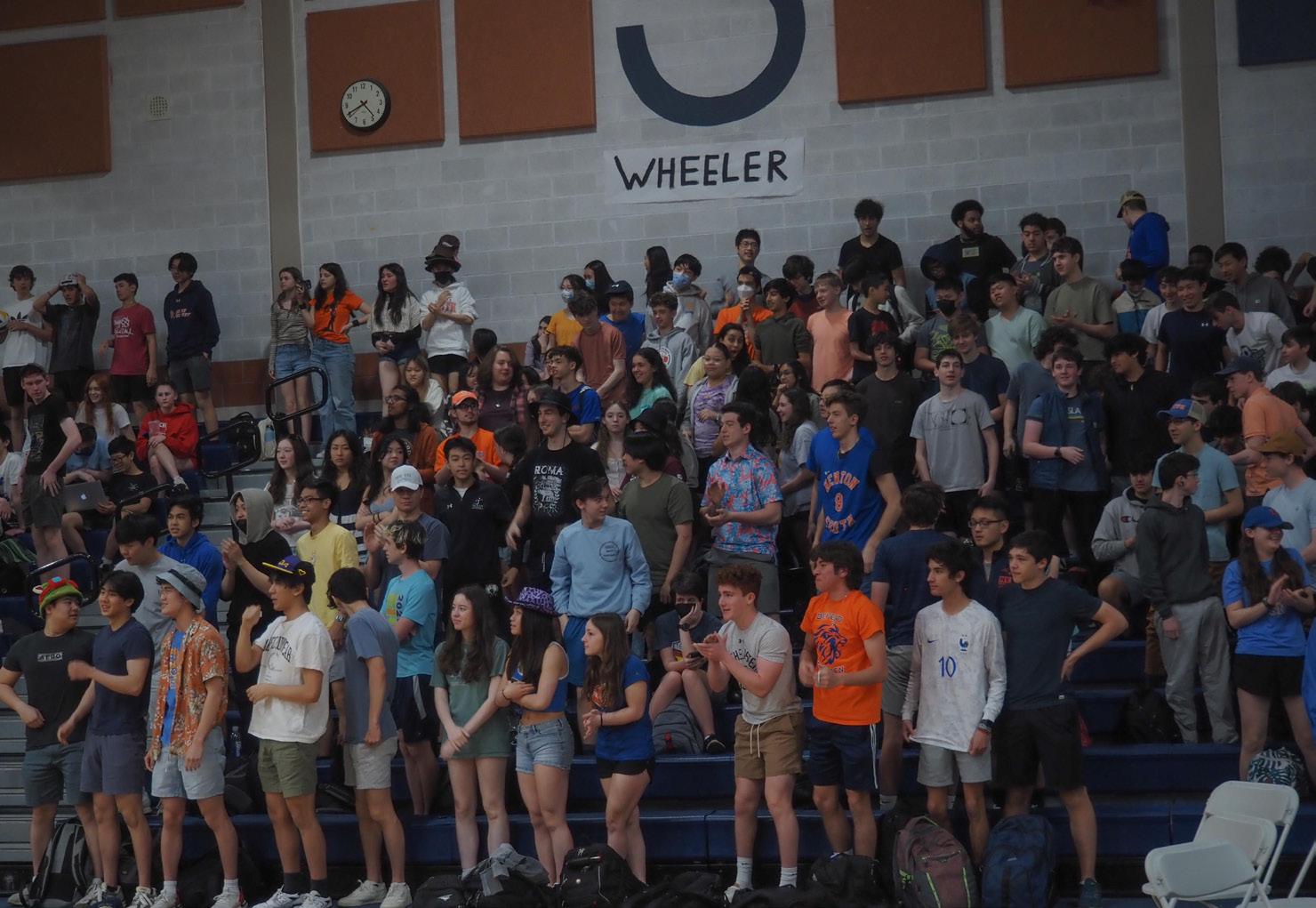
Along with that, for the rst time since 2018, a team of South students brought back the Lip Dub, an annual tradition where students dress up and line the halls with their clubs and sports while lip-synching to popular songs.
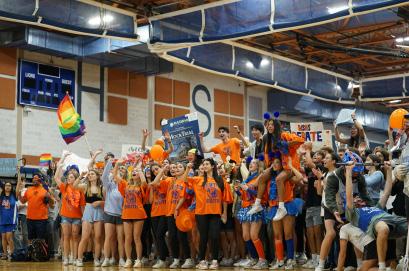
Tae Hong, a senior lming the Lip Dub, said she sees it as an opportunity to strengthen South’s community.
“For the seniors, COVID started in freshman year, so we never really felt like we

Freshman Ritu Raghavendra said that although she liked the idea of the rally, there were points that felt too forced and that the whole thing felt overly promoted.
“When they ran around with the house names, they were trying to get you hyped up, but really, I didn’t feel any connection,” she said.
However, Yang said he hopes events like the Pep Rally and the Lip Dub will feel more genuine in years to come.
“As a class o cer, your job is to instill school spirit, so in some sense, it's forceful,” he said. “ e idea is to create a seedling that will eventually grow into something new.”
“ ere should have been singing, there should have been more time where people could play more games,” she said.“I felt like everybody should have been included.”
Despite his position as a class o cer involved in planning the Pep Rally, senior Dylan Shanahan said he isn’t a huge fan of big events that are designed for the sole purpose of school spirit.
“ e way we try and manifest spirit is not necessarily the way that it's important,” he said. “I was never really into the whole [wearing] blue and orange and stu like that, but I do feel that it's important to like feel like you're at home in this place”
Shanahan said that he doesn't necessarily believe that school spirit is nonexistent; he said that true school spirit comes in nding a sense of home at South, which is stronger than most people recognize.
“It's more the whole community at large that I feel connected to. People are nice and welcoming, and when you have that you don't really need to bond over the color of [your] shirts,” he said.
English teacher and Passin’ Time coordinator Alan Reinstein said that he agrees: he said that rallying around a sports team isn’t the only way for the student body to feel connected.
“Students have a lot of spirit, it’s just not in the conventional way of school spirit, wearing their colors,” he said.
In terms of that conventional spirit, Shimoni said this is just the beginning
“[ e Pep Rally] is a step in the right direction,” he said. “We've wanted to use the spirit rally and the houses this year to strengthen
spirit in our houses and have that be a thing for the future.”
In terms of feeling like a part of a larger community, Shanahan said that unity has never really left. at’s what a lot of people are going to miss,” he said. “School breeds community. We're all sitting in the classes all day together, it’s hard not to become friends.”
As a class o cer, your job is to instill school spirit, so in some sense, it's forceful... e idea is to create a seedling that will eventually grow into something new.
Kevin Yang class president '24
People are nice and welcoming and when you have that you don't really need to bond over the color of [your] shirts
DylanShanahan class officer '23 photo by Levin Brenner Students show support for their house at the Pep Rally Students ll the eld house for the Lip Dub
Although nearly every classroom houses a green recycling bin, most of these bins' content ultimately does not make it to the plant.
Due to contamination within the recycling bins, South does not consistently recycle, a symptom of general environmental apathy in the community.
e Sustainability Squad, a new studentled club focused on increasing school wide climate literacy, has been working closely with members of the South Senate to address longstanding recycling issues.
South senator and member of the Sustainability Squad, junior Max Hawthorne said that many students don’t know about the current recycling issue at South.
“It’s really interesting how few people at our school are aware of the issue itself,” he said. “ e issue is most things in recycling bins are not being recycled at all, and the teachers that I speak to seem to be very well aware of it. To them, this is an ongoing issue that they've seen over and over again.”
Sophomore Emma Yao said her knowledge of the recycling issue at South is limited.
“I haven't heard a lot of people talking about it speci cally, but since we have so many mice problems, I've had a suspicion that our trash and recycling systems are not that great,” she said.
History teacher Michael Kozuch said that the school’s recycling issue drives teachers
to take matters into their own hands.
“Some of us teachers even take stu home to get recycled in our own personal recycling bins, just to try to ensure that it actually gets recycled,” he said. “ e problem is not visible to everyone,” he said. “ ere are some teachers who don't know that there are problems with our recycling. A part of the solution is to make people aware of what's happening and how to x it.”
However, this issue has not been easy to solve; South senator and sustainability squad member Marty Basaria said that the contents of trash and recycling aren’t being separated.

“I’ve seen custodians just dump their recycling and trash into basically the same thing,” he said. “And you can sometimes see it this year where they pick up both the trash and
recycling and just dump it and it eventually gets disposed into the same dumpster.” us, Hawthorne said that there is only so much that the Senate can do to solve the issue.
“Senate is famous for being really inefcient, [so] what can we do ourselves?” he said. “Physically going out and just putting up these posters instead of sending 30 emails to Mr. Williams about logistics. First, print the posters, and get students aware about it. I'm using my position to kind of make it more e cient … ”
Sustainability Squad leader and senior Sasha Fine said the group drew inspiration from history teacher Andrew ompson’s Sustainability course; their work has developed into a collaboration with the Senate.
“Sustainability is a course with Mr. ompson. He encouraged many of his stu-
dents to meet during WIN blocks, there were only a couple of us that came consistently and we formed the club from there,” she said. “We started collaborating with Senate a lot, and then there was also an environmental club. In the last two months, we started working together.”
Basaria said the Squad has found a way to encourage recycling while avoiding the challenges that come with passing a bill by teaching students about recycling through posters.
“We found a faster solution and this is spreading posters around the school encouraging healthy recycling behavior and giving a guide about how to recycle items,” he said. “It’s a small yet big way to create change without having to go through administration. It's a small step towards a bigger goal.”
Vice Principal Jason Williams said a possible rst step for the Squad could be providing more recycling bins around the school.
“It's just a matter of whether we're able to recycle, as we only do it in some parts of the building,” he said. “I couldn't tell you exactly where, but it is a good task for a sustainability group to take on the inventory of where there are recycling bins and where there aren't recycling bins.”
Fine said she hopes that the Sustainability Squad can ultimately inspire South to help the environment.
“People can come to the Sustainability Squad, bring their ideas and network with other people who care about the environment,” she said.“It has the potential to impact the student body to become motivated about changing the environment.”
e rst thing most people notice about senior Ainsley Ecko is her outlandish spirit. Eckho has dressed in her mother’s wedding dress and ridden around on a motorized unicorn — she’s even dyed her cat pink for a football game.
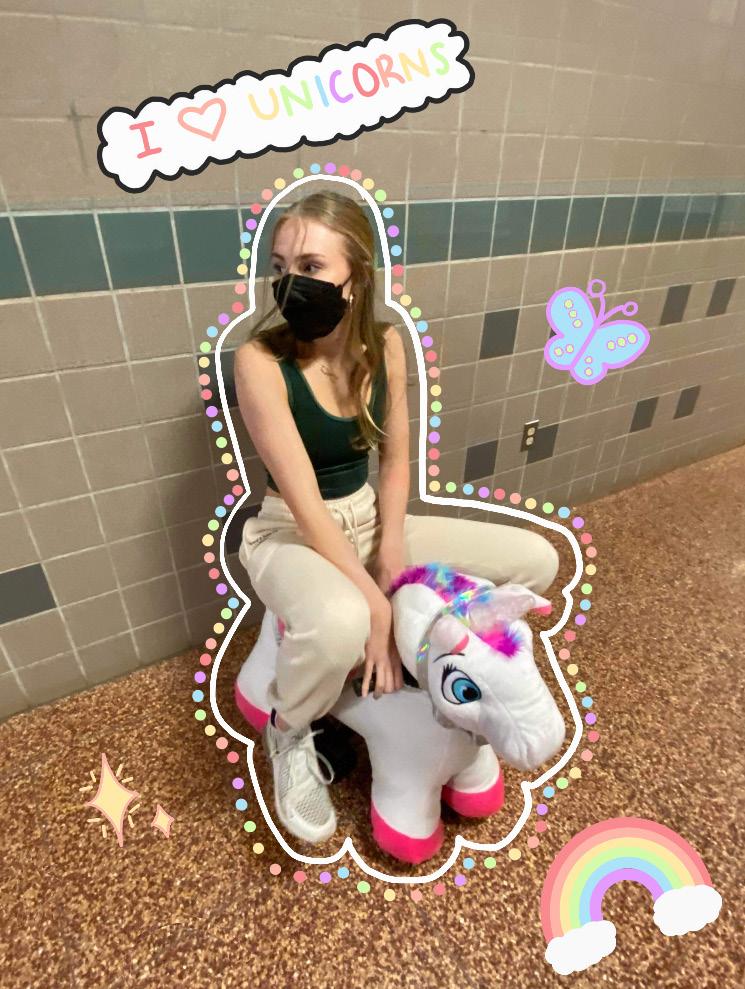
“I don't think anyone had seen that before, so it was a lot of fun,” she said. “A lot of teachers and friends came to meet my cat.”
As a teaching assistant for a sophomore chemistry class last year, Eckho and her friend senior Pearl Berzin ran the class after the teacher left, easing the transition of many rotating substitutes. Eckho worked with science department head Gerard Gagnon to guide the situation.
“She was a great asset in terms of her ability to support the kids, but also then to pull me into the solution when I could be helpful,” Gagnon said.
Eckhoff met junior Hailey Smith through the chemistry class and they remain close friends today.
“She tries so hard with everything that she does and it's really impressive," Smith said. “She's one of my best friends and I'm so grateful to have met her.”
Eckho worked with the Leukemia and Lymphoma Society during her freshman year in Alabama where she raised almost $100,000 in just a few weeks. is money was used to fund a grant which helped people with blood cancer.
Tricia Center, Eckho ’s mentor for the program, said that a large factor of the fundraiser's success was Eckho ’s determination.
“[Eckho ] was very driven and really, really wanted to make a di erence,” she said.
Inspired by her sister’s muscular dystrophy, Eckho started the Students Empower-
ing Communities program for the Muscular Dystrophy Association when she moved to Massachusetts, which has since gone national.
“It was really exciting to see the millions of dollars it's bringing in and to see the impact it has,” she said. “It's really ful lling.”
Having moved just a couple of years ago, Eckho ’s ability to put herself out there has also made her well-known in the South community, Berzin said.
“[Eckho ] really does a good job of trying to meet lots of di erent types of people, being very open about meeting di erent kids at school and making friends with di erent people,” she said.
Eckho said that moving to South made her a more open person.
“I was forced to really connect with the community here, so I wasn't so alone the rest of my time here,” she said. “It's been really nice to create such deep connections in such a short amount of time with the faculty and other students.”
Physics and math teacher Ryan Normandin said that he admires Echko ’s con dence and ability to advocate for herself.
“I'm really impressed with her and her persistence and her ability to connect with other people and work really well with them and not give up when she runs into challenges,” he said.
As graduation approaches, Eckho said that the end of her time at South is bittersweet.
“I'm glad to nally be done with everything, but it's still hard saying goodbye to the teachers, students, sta and building that I've been in for a couple years now,” she said.
As for her future, Eckho has committed to the University of Miami and currently plans to major in biomedical engineering. Eckho loved her biology class at South and is also close to the subject because of her sister’s muscular dystrophy.
“I'm surrounded by biomedical appli-
ances and, being in the hospital, I’ve seen the consumer version of it, so I'm excited to be a part of the creation of it,” she said.
Normandin said that Ainsley Eckho
is truly one of a kind and that she has made a positive impact on so many people.
“She contributes so much to South,” he said. “We’re going to miss her next year.”
Whether it’s sharing a home with an unfamiliar family or exploring an unknown part of the world, the memories students make during foreign exchanges and trips are never forgotten.
Hosted by the world language department, these trips aim to immerse students in the diverse cultures they are introduced to in their language classes. Because of the wide variety of languages o ered, each trip is uniquely tailored to its program.
Students participating in this year’s Ar-
primary school kids because it's a mixed year school, so kids would ask us to sign things.”
Cynthia Manthei, a Spanish teacher who oversees the Argentina exchange program, said that while she felt apprehensive about her students’ ability to adjust to daily life in Argentina, they acclimated well.
“I was concerned that the students who went with me wouldn’t be able to adapt to living with a family they didn't know in a culture they didn't know,” she said. “It’s a big thing. But they were ne.”
Students participating in the French exchange hosted French students in February. ey have not yet traveled to France but will do so in June. Deborah Hahn, a French teacher and one of the organizers of the exchange, said that she prioritizes immersion when planning the group excursions.
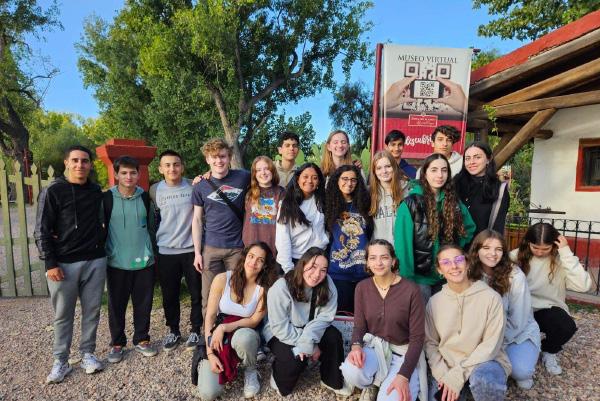 Deborah Hahn
Deborah Hahn
gentina exchange, open to select students who study Spanish, hosted Argentinian students for two weeks and traveled to Argentina in April.
Ari Zeren, a senior who participated in the exchange, said that discovering the academic culture in another part of the world was an exciting part of the trip.
“We would go to the school during the week, which was actually fun because we were kind of famous there,” he said. “We would do these little
“ e idea is built around being an exchange and not merely a trip,” she said. “ e students are living with host families in real apartments [and] houses, so evenings will be with their families and the families will take them to do activities. During the rest of the time, we'll have organized excursions.”
Hahn said that the most signi cant part of the trips is being able to learn the language through immersion.
“ e point of having an exchange is to really get students to make [a] connection that this is not just dry material in a textbook,” she said. “ e reason you learn a language is to connect with other people in the world.”
Freshman Victoria Rubin attended the Latin program’s Rome trip, which was done in partnership with North’s Latin program. She said that since Latin is considered a dead language, the focus was more on history than immersion.

“We went to a lot of historic sites and
cultural sites and then got to learn about the premise of those both in historical and in Latin context,” she said.
Rubin said that while a language barrier was present during the trip, it wasn’t extremely hindering to the group’s experience.
“We had a teacher and a couple of students who spoke Italian and they were able to help us and guide us,” she said. “All the people who I spoke to spoke English, so the language barrier wasn't much of an issue.”
A substitute for the previous Moscow trip, South’s two-week Latvia program was implemented this year for the rst time since approximately 2009.


Russian teacher and trip organizer Jill Christensen said that because of the war between Ukraine and Russia, she chose Latvia as the destination to prioritize safety while still providing the immersion experience.
“I wanted somewhere the kids could go and practice and study Russian that was safe,” she said. “Latvia used to be a Soviet Republic, so there's still a lot of people there who speak Russian.”
Joshua Freedman, a freshman who went on the trip, said that the Latvia trip is, in part, made special by the Latvian culture.
“It's a unique class o ered at Newton South and we have a unique opportunity in Latvia,” he said. “Latvia is a melting pot of cultures; there's German in uence, Russian in uence and some Scandinavian in uence as well.”
Freedman said that the country’s history made it more challenging to speak the target language.
“No one really likes speaking Russian there,” he said.“ ey nd it rude, especially some
of the younger people, because their country was [annexed] by Russia.”
Zeren said that the Argentina trip gave him a new perspective on life and school.
“I gained an appreciation for how overly stressed South’s academic culture is in a way that I didn't fully realize,” he said. “Seeing a much more relaxed, friendly high school environment was really important for me to just reconceptualize my life a little bit. I de nitely value the
academics at South but I think it's really nice to be able to get a di erent perspective and see a di erent way of life.”
Hahn said that students participating in the exchange forged strong relationships with the group visiting from France.
“A lot of the people really made very solid connections. At the airport goodbye, everybody is kind of in tears,” she said.“It doesn’t mean that everybody stays best friends their entire lives, but you'd be surprised at how these relationships can endure.”
e point of having an exchange is to really get students to make [a] connection that this is not just dry material in a textbook.
French teacher & exchange coordinatorphoto contributed by Ari Zeren Students who participated on the Rome trip visited many iconic historical sites photo by Bella Ishanyan, graphics by Emily Cheng Spanish exchange students visited Argentina for two weeks
Seeing a much more relaxed, friendly high school environment was really important for me to just reconceptualize my life a little bit.
Ari Zeren class of '23

When should you follow your leaders? When should you break away? Graduating seniors are invited to have even more independence to choose their own default positions regarding obedience and dissension. Should you follow the rules until the necessity to out them is clear, or stay skeptical and join cautiously?
At the beginning of May, I decided to cancel the Term 4 edition of Passin’ Time, electing to support my union’s leadership by suspending the creative enthusiasm of students and teachers who had signed up to perform for the nal Passin’ Time of the school year.
A week earlier, the Newton Teachers Association (NTA), exasperated by the slow movement of the new contract negotiation process, decided to push beyond “T-Shirt Tuesdays” toward“Work-to-Rule Tuesdays”, a more intense act of solidarity meant to raise further awareness about the teachers’ discontent.
A “work-to-rule” union action is a protest where employees work only during o cial contract hours — 9:00 am to 4:45 pm for South teachers on Tuesdays — in order to show their signi cant value to the community. Teachers working only according to the“rule” of the contract aim to show just how much extra unpaid work they regularly do so that employers will come around to respect the teachers’ reasonable contract requests.
e NTA’s action is “modi ed” because teachers are asked to practice this protest only one day a week. Because the Term 4 Passin’ Time was scheduled for a Tuesday, during Lion Block, I canceled it.
The natural and intended consequence of any work-to-rule action is some degree of loss or discomfort for those who interact with the actors. In the case of the NTA’s “modified work-to-rule” action, students and school community members are meant to feel this discomfort through various consequences: for example, teachers’ delayed or sparse feedback on assignments or the cancellation or suspension of clubs or activities. en, adults who vote putting pressure on the mayor or school committee to make necessary adjustments that will support the teachers’ contract hopes.
Does canceling Passin’ Time pass the NSHS Core Values test? Did I take responsibility, show respect, listen and choose to act with kindness? Well, I did take responsibility: I announced my decision and reasoning to all students through Schoology. Was it respectful? I don’t know. I never know. You never know. Of course, you know that I was not trying to be hurtful, but when a person or group is injured by an action meant to help another person or group, there is inevitably a desire to bring out the su ering scale to nd out which side is injured more deeply. Are the missing-out Passin’ Time performers aching more than a teachers’ union whose work-to-rule action may be fractured by uneven participation? ere is rarely a ledger available that is capable of showing the clear balance of discomfort that our actions cause.
Although I’m dubious about the e ectiveness of a work-to-rule protest, I respectfully deferred to union representatives whose judgment I respect, and I was eager to play a part to support the action.
 By Alyssa Chen, Joshua Freedman & Andrew Lindsay
By Alyssa Chen, Joshua Freedman & Andrew Lindsay
As one of the most popular faces in music today, Taylor Swift’s ongoing Eras Tour is a testament to her popularity. Just three weeks ago, thousands of fans ooded Gillette Stadium to see her perform a celebration of her greatest hits throughout her music career.
“ roughout COVID, she has been a constant force of positivity in my life,” she said, “She's honestly what really got me into listening to music.”

Freshman Ira Singh said she became a fan in the fth grade and Swift has made a positive impact on her life ever since.
Tickets for the Eras tour were notoriously di cult to get — more than a million fans ooded Swift’s Ticketmaster page on the day tickets went live, but only a fraction of them successfully purchased tickets.
Singh said she had to go to great lengths to obtain a spot at Swift’s Foxborough concert.
“I signed up for veri ed-fan and then obviously the presale was at 10 a.m., so I convinced my parents to get tickets for me,” she said. “I was in advisory and my classes, calling my parents to ask if they got the tickets yet.”
Sophomore Amelie Hirst said that other than looking forward to the music, she was excited about the Swift-inspired out ts fans would wear.
“I'm so excited to see everyone's di erent out ts because it's really blown up on TikTok,'' she said.
her apart from other artists.
Junior Alex Zheng attended the rst night of Swift’s concerts at Gillette Stadium and said that it was packed to the brim with surprises.
“It was very chaotic and [there were] a lot of people there. It was kind of a mess, but it worked out really well. e fans were all really nice,” he said.
“[Swift’s] ‘Bad Blood' performance [was really good] because there was re going and a bunch of reworks.”
Zheng said that a large part of Swift’s popularity is her vast array of music styles and strong lyricism.
“You could probably nd something that resonates with you because she has such a wide range,” he said.
“A lot of people resonate with the songwriting and the lyrics, and [although] they’re also invested in her as a person with her life and her love life, it's really the songwriting that keeps the people coming back.”
Kali Uchis has been in the limelight ever since her song “Telepatía” went viral on TikTok in 2020, landing the album Sin Miedo (del Amor y Otros Demonios) onto the Billboard 200 for the rst time. e star kicked o the American leg of her tour in mid-April, arriving in Boston to play at Fenway in early May.
Sophomore Chloe Hu has been a fan of Uchis for years, and she said she rst discovered the artist through her hit song “Telepatía”.
“[‘Telepatía’] sounded so euphoric, but I could also hear a lot of the drums which I really liked,” she said. “It was just really addicting, and I couldn’t stop listening to it.”
Hu said that Uchis’ songs set
Lesser-known singer Gracie Abrams also hosted a concert recently. Abrams is a young songwriter that is gaining popularity with her moving and poetic music.
Freshman Summer Montgomery, a fan of Abrams, said that Abrams’ songwriting is packed with emotion.
is always so truthful and raw,” she said.
“[Her music] sounds so dreamy and not a lot of artists create that kind of music,” she said.
Hu said that although the music Uchis creates has a wide range of variety, her talent and excellence is present in each of her songs.
“Generally, [her music genre is] indie pop and pop, but the di erent songs give o di erent vibes and all of her songs are good,” she said.“[Uchis has] a blend of di erent music styles [which can] really reach a large audience.”
Hu said that Kali Uchis’ music is widely recognizable and impressive, and for new listeners, Hu has one recommendation.
“Two really big things that are prevalent in her music are her amazing vocals in all of her songs and also the beat that you can always hear in the back which keeps you [engaged] when you listen to it,” she said.“Listen to‘Moonlight.’”
Beyond pleasant vocals, Hu said that
Sophomore Mia Lahav said Abrams’ single “Mess It Up” is a masterclass of sounds alongside the song’s expressive and cinematic music video.
“I love the music video for [‘Mess It Up’]. It's really creative and was super entertaining to watch,” she said.“ e bridge is one of my favorite parts [because] the mixture of her soft-toned voice with the upbeat music goes really well. It doesn't clash or anything.”
Montgomery, who attended Abrams’ concert in March at the Boston House of Blues, said that the concert was lled with fans just as passionate as her.
“It was pretty emotional [being at the concert],” she said. “It was amazing being in a room full of people who all connected to this music and all knew every single lyric and were singing along.”
Abrams was also one of the artists who opened for the nal Foxborough show of Swift’s Eras Tour and Lahav said she per-
Uchis’s music has a large impact on her.
“Her music allows you to relax and teaches you that it's okay to have big feelings,” she said. “[Her songs teach] you to be who you are and just live your life.”
formed songs from her most recent album Good Riddance which paired perfectly with Swift’s main act.
“[Gracie Abrams was] a good opener, because Taylor’s songs also have that calming sensation to them, and it re ects in Gracie's voice,” she said.
Lahav said that Abrams has a charming quality about the way she expresses herself, especially through music.
“Her clothing style is very minimal, but she has her own little personality in it too which can attract some people,” she said. “Her voice is really special.”

Lahav said that Abrams has become a staple artist over the last couple of months.
“Her songs have de nitely been comfort songs to me,” she said. “You can always just go play that [Abrams] song and it's a go-to, you don't really have to think about it. [You can] just play a little Gracie song.”
Softball has been an integral part of South’s athletic community for over 40 years. is season, the softball team is currently 24th in the Division 1 power rankings with a high likelihood of being one of the 32 teams to qualify for the state tournament.



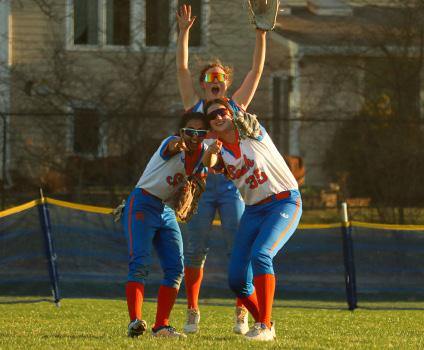
Sophomore Lauren Kelley has played softball for 11 years and said that with this season’s successes, they have a chance at making recent school history within the Dual County League (DCL).
“I don't think that we've placed rst in the DCL since before 1980, so that would be huge,” she said. “Especially to just be a part of the team to nally do that would be awesome.”
Freshman Paige Taylor said that throughout the season, the team has been focusing on the games in front of them rather than playing with the sole intent of going into the postseason.
“We're trying to win enough games to get a good seed, so that's de nitely something that's motivating us a little bit,” she said. “We try to just take it one game at a time and not just think about the future.”
Kelley said that much of this season’s success is due to the close bond the team shares on and o the eld.
“It's hard to succeed with a team that you're not comfortable with, and because we're so comfortable around each other, we can all make mistakes and we all learn from them together.” she said.
Zoe Goldberg, a senior committed to the University of Toronto’s varsity softball team next year, said that the softball team’s
bond this season feels di erent from past years.
“We're all really close friends, and that was something that was apparent, even right from the beginning of the season,” she said.“We've always been a close team but de nitely this year it’s something a little bit di erent and special. We just love each other and that has really helped our team this year.”
KYRAH: Although it's an individual sport the team is just so great, so supportive, andthen because it's an individual sport, you're kind of just competing against yourself.
ILAN: I like the bonds and community we have especially with the distance runners who are on the team all three seasons and even train together over the summer. You really form lifelong relationships.

KYRAH: Four years. I started in 6th grade, and then took a break due to COVID. I picked it back up freshman year. My older brother ran track and persuaded me to join.
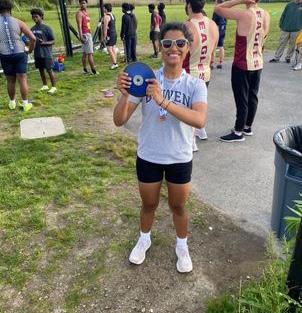
ILAN: I started as a freshman, so this is my third year. I didn’t really know anybody coming into South as a freshman, since I'd come from private school. at's kind of how I met people and made friends in the beginning.
What's your pre-game ritual?
KYRAH: I eat a pack of Ritz peanut butter crackers, like an hour or so before I throw. I drink a lot of water and I listen to some good chill music just to get into the right mindset
ILAN: I like to take a couple laps of the eld just listening to music really loud 15 to 20 minutes before I race.
Head coach Jesus Rodriguez said that this year’s team holds a special group of players.
“Every four years is di erent, di erent kids and di erent attitudes, di erent culture,” he said. “It's a really good team. ey're all great kids, that's for sure.”
Sophomore Vivi Shreve said the fun and inclusive energy in the dug-out really
brings the group together during the long season.
“You really feel like you're on a team. You're very welcome [on the team] and part of it immediately,” she said.
With South’s positive environment contributing to much of its success, the team has leaned heavily on the leadership and example set by their captains. Senior and captain So a Hazarika said that she has an important responsibility as a team leader and an upperclassman on a team with several younger players.
“[Being a captain] is being more like a mentor and making sure that everyone else is ready for the game along with yourself,” she said. “You're not just focusing on yourself.”
Yearly changes in an athletic roster can often disrupt the dynamic of the team, but luckily for the softball team, the new lineup has led to a successful and balanced team. Goldberg said that the two freshmen who joined the team this year are a major reason for their success.
“[ e freshmen] are incredibly talented and immediately stepped onto the eld as leaders to push our team to the next level,” she said. “Our team would be so di erent without them and they’ve made a huge impact already.”
As South looks to hit it out of the park in the upcoming state tournament, their support for one another will remain, Goldberg said.
“Win or lose, we have a lot of fun,” she said. “We’re just there for each other. e friendship that we have continues.”
What do you think about while competing in your event?
KYRAH: I try not to get in my head. I nd that that helps because you get into the circle and you're alone. Just being excited to be there kind of calms me down so I can perform my best.
ILAN: Running is always tough. I try to smile if I can because that makes it much less painful. I also let other people push the pace until you get into that last half mile, and then you really start picking it up.
What does breaking the record mean to you?
KYRAH: at record is proof that I can succeed even though I'm not the biggest or the tallest of anyone. at sounds really cheesy, but it's almost like a hurdle that I was able to get over.
ILAN: I think I broke the previous record by two seconds. e previous record had been in place since 2011, and I was hoping I get it by the end of high school.
With playo s underway, chaos is already ensuing within the National Basketball Association (NBA). e Miami Heat versus Milwaukee Bucks matchup was one not many paid close attention to, but the fourth game of the seven-game series was the big turning point in the series, with the Heat taking a 3-1 lead.
e Heat would go on to win Game 5 and ultimately the series, a historic victory being one of the few eight seeds to ever take down a one, and the rst ever to accomplish it in only ve games.

With the Bucks highly favored to advance far into the playo s, and the Heat expected to not put up a ght, the recent defeat is now recognized as one of the biggest failures in sports history. During a press conference after the loss, two time league Most Valuable Player (MVP) and 2021 NBA Finals MVP Giannis Antetekunmpo was asked if he viewed the season as “a failure”.
Antetokounmpo, seemingly irritated by the question, extensively explained his de nition of failure. He referenced notorious basketball legend Michael Jordan saying that falling short is just a “step to success”.
The Bucks’ all-time leading scorer understands the lasting impact of this loss. While awards and regular season success adds to a legacy, winning in the postseason is key to becoming a legend. Holding the top record in the regular season provides an advantage in the playo s; however, stellar playo performance solidi es a player as one of the all-time greats.
e 2023 Boston Bruins are a primary example of a massacre — a Boston Massacre,
for that matter. e Bruins had just come o of the greatest season in National Hockey League (NHL) history, nishing with a 65-12 record in the regular season.
e Bruins brought Boston fans to their feet the entire season, with players such as David Pastrnak and Patrice Burgeron leading the way. Although it seemed inevitable that a Stanley Cup title would arrive in Boston, that did not end up being the case.
e Bruins were matched up with the Florida Panthers, a wild card team that nished just ten games above .500. With the Bruins only losing four games at home the entire season, it seemed impossible for them to not skate by the Panthers.
the regular season and playo intensity and pressure level. Regular season success only goes so far, a main reason for talented teams struggling to perform come playo team unable to rise to the occa sion are looked down upon as their disappointing true colors are revealed under the bright lights.
e Bruins held a 3-1 advantage before dropping three straight to lose the series. ey lost three home games in this series alone, making the defeat even more dreadful. You could think of the brutal loss the way Antetekunmpo thought about his defeat, in that they are “steps to success.”
After a historic season of winning, however, a championship is vital to achieve the ultimate success. It looks like the Bruins forget there are four rounds to win in order to reach a title.
Similarly to the Bruins, in 2007, the New England Patriots made history as they went 16-0 in the regular season, beating the Miami Dolphins record of 14-0 in 1972. e Dolphins went on to win the Super Bowl that year, completing the most signi cant accomplishment in American Football. e Patriots, led by quarterback Tom Brady, head coach Bill Belichick and wide receiver Randy Moss, won their games. After defeating the San Diego Chargers in the American Football Conference Championship Game,
they moved on to the Super Bowl to face an above average New York Giants team. e Giants had gone 10-6 in the regular season, and after miraculously making the Super Bowl, they were 12-point underdogs.
Against all odds, the Patriots were defeated 17 to 14 by the Giants, ruining their hopes of a perfect season. is was a crushing moment for all Patriots fans, but was it really a failure? Ultimately, the Patriots achieved the most regular season success possible: they had a top- ve defense and among the best o enses in the National Football League (NFL). Yet there will always be an asterisk next to the 2007 Patriots season indicating that even though Tom Brady won MVP, even though Randy Moss broke the all-time touchdown record for receivers and even though the Patriots to this day still have the most wins ever in the regular season, the team will always be known for falling victim to an underdog team when it mattered most.
Whether it be hockey, basketball or football, failures in professional sports are brought to the attention of fans everywhere. Teams have rolled through the regular season breaking records and having fun until the postseason rolls around, and these elite regular season teams inexplicably drop the ball. is trend raises the question: is the season as a whole dubbed a failure? ere are many ways to view it, but losing in the most critical moments is not a re ection of failure, nor success — it is the valuable lessons learned and the vital experience gained that truly matters.

Looking to make a little cash without a big time commitment? Or maybe you just love sports, and you’d like a chance to stay involved in the game without actually playing.
From umpiring baseball to lifeguarding to refereeing, there are plenty of di erent options to make money working in sports. O ciating a sports game can be a fun way to make a quick buck, and the exible schedule is enticing to many busy students. It can also help you connect with people in your community that you may not have known before and allow you to form a deeper connection with the sport overall.

Sophomore Josh Feiner started umpiring baseball in 2019 and quickly fell in love with it.
“I love playing baseball so much, so I want to pass that joy on to the younger generation,” he said.
Feiner said that since he now has experience working within the sport, he feels a greater sense of gratitude towards other sports workers.
“As much as I do sometimes complain about the umpires while I'm playing, it does make me appreciate their work during my games,” he said.
Sophomore Ruby Berzin, who teaches gymnastics to younger children, said that working as a coach has given her a di erent perspective of the sport and others who immerse themselves within it.
“[Coaching] de nitely makes me have more respect for my coaches and the people that teach me in my sport,” she said. “Being the
person that's working de nitely teaches me how people in the working industry want to be treated.”
For many students, sports is a sector where they get some of their jobs and rst experiences in a workplace environment.
However, getting a job in sports is no walk in the park. One commonality among the experiences of those working in sports was that one of the downsides of the job was the heckling from parents and coaches.
Sophomore Aaron Wak sler, who’s been umpiring since he was 14, has needed to face that challenge. “
ing your emotions so you don't throw out the bald angry parents who seem to have no idea that this is Little League and not the MLB,” he said. O
Feiner said that the pressure is on to make the correct call in a timely fashion.
“Some of the plays happen so quickly, so you really have to be quick to make your decision,” he said.
Luckily, the hard work comes with a substantial reward. Multi-sport coach Justin Feinberg spoke to the bene ts of being a basketball referee.
“It's probably the highest paying job nd as a high school kid,” ciating sports games as a high schooler pays around $25 to $30 an hour, which is pretty good compared with jobs like a cashier that only pay around $16 per hour.”
Feinberg also said that working in sports also provides an educational bene t and teaches students various life skills at a young age.
“It’s a good experience where you get to learn a lot of things, such as how to deal with people and interact with adults and kids,” he said. ese skills are especially emphasized in another sports job: coaching. As a coach, you have more control over the game, and you get to organize the team in ways that you normally wouldn’t as a player.
Senior Russell Lee, who coaches volleyball for the Boston Youth Area Volleyball Club, talked about the managerial and strategic aspect of the job.
“As a coach, you feel more like the player in a chess game than one of the pieces,” he said.
However, if coaching or o ciating sounds like too much stress and pressure, you can lay back and relax in a lifeguard chair by the pool. Sophomore Lucas Nelson has enjoyed lifeguarding for two years.

“It’s really easy. I get to be outside in the sun and it’s very nice,” he said.
e world of sports is vast, with opportunities in every direction you look. If you’re looking for something exciting and engaging, you might nd refereeing a lot of fun, but if you want something a little more laid back, lifeguarding is a good option.
However, the one thing that stood out across interviews was how much everybody enjoys their work and, of course, the chance to make some extra cash. ese jobs are fun learning experiences that forge connections across communities
Students in athletic workplaces nd ful llment from their sport in a unique way. Freshman Mariana Alencar, who coaches volleyball, said that she enjoys seeing the next generation of volleyball players.
“It reminds me of when I was little, and I get to see that passion all over again,” she said.
As much as I do sometimes complain about the umpires when I'm playing, it does make me appreciate their work during my games, Josh Feiner class of '25graphic by Lynn Kim graphic by Denise Chan
 By Levin Brenner & Sarah Schwartz
By Levin Brenner & Sarah Schwartz
With the 2023 Women’s World Cup kicking o this July in Australia and New Zealand, spectators across the world can expect to see some unfamiliar faces on the pitch and perhaps even some unexpected countries threatening to hoist the trophy that millions of fans have prized for generations.
A new wave of young and talented players are arriving on the scene as they look to make an impact and help lead their countries to their sport’s esteemed glory. e rosters of many nations will likely look much di erent from previous World Cups as a youthful turnover of talent takes place.
After the United States stood atop the
winner against Germany to secure the Euro Cup 2022 win, along with Lauren Hemp and Ella Toone, who scored the opener against Germany in the nal, all look to make the 23-woman squad headed to New Zealand. eir young talent and determination makes them appealing candidates for head coach Sarina Wiegman.
e U.S’s former quarter nalist opponent, France is seeking to lift the cup for the rst time after their devastating 2-1 loss 4 years ago. With the help of Euro Cup stars, including Selma Bacha, Clara Mateo and Ella Palis, France’s potential roster is looking to once again be a formidable opponent for the U.S. Injuries will also play a signi cant role
@nshslionsroar posted a poll on instagram, where 110 South students voted on controversial "sports"
been overwhelmed with injuries to key players on their formidable roster as mid elder Fran Kirby and defender Leah Williamson are out with knee injuries, and striker Beth Mead will likely not be available to participate due to a torn ACL last November.

Similarly, the Netherlands will certainly not bene t from all-time leading scorer Vivianne Miedema, still recovering from a torn ACL.
e competition to achieve soccer’s most sought after success will include a diverse group of nations as several up-and-coming teams look to knock o and dethrone the usual and perennial powerhouses.
e U.S. has a tall task of defending its
podium in 2019, the 2023 tournament will be U.S. coach Vlatko Andonovski’s rst World Cup with the team as he replaced longtime coach Jill Ellis. Andonovski is presented with a unique challenge of selecting a roster that looks to defend its nation’s world championship.
Andonovski’s roster will likely include many young faces who, like Andononvski, will make their World Cup debut. After making their mark in international friendlies and the She Believes Cup in February, impactful players such as Sophia Smith, Naomi Girma, Ashley Sanchez, Trinity Rodman and Alyssa ompson will ght to make Andonovski’s 23-player roster.
Smith, Rodman and ompson are young, fast and dynamic forwards who have shown their elite ability to score in their play for their National Women’s Soccer League (NWSL) teams. Sanchez has shown her ability to control the pace of the game and facilitate play in the mid eld, while Girma has proven to be a strong and formidable force in the back line.

England’s Chloe Kelley, who scored the
in determining the outlook for each nation’s chances to bring home the world championship. Injuries have ravaged key players from many top countries.
Notable veteran players from the U.S. such as Christen Press, Tobin Heath and Julie Ertz have had lengthy international careers and strong previous World Cup experience, but have recently been battling serious injuries.
eir statuses for this summer’s tournament are still up in the air as they look to make their long awaited return to the world’s largest stage.
Rose Lavelle, Samantha Mewis and Mallory Swanson made their World Cup debuts in the 2019 World Cup when they helped lead the U.S. to its fourth World Cup title. Lavelle, Mewis and Swanson are all working through their own signi cant injuries and Andonovski will have to make important decisions regarding the health of these key players and those who might replace them.

Other nations are not exempt from injuries and are likely to miss out on action from their dominant players. England has
world championship as Alex Morgan and company work to stave o familiar and unfamiliar foes. Experienced and dominant competitors such as France, Canada, England, Sweden and Germany hope to nally dethrone the U.S. and hoist the World Cup trophy.

Young and hungry nations such as Spain, the Netherlands, Brazil and Australia also look to threaten those atop the rankings.
International greatness will meet again as Alex Morgan of the U.S., Sam Kerr of Australia, Lucy Bronze of England, Christine Sinclair of Canada and Marta of Brazil will once again share the grandest stage.
e Netherlands will face the U.S. on July 26 for an intriguing rematch of the 2019 World Cup Final that will also act as a testament to each nation’s respective development and current talent.
is summer’s recurrence of soccer’s most important event will once again draw spectators with exceptional play and inspiring stories and at the same time introduce the world to the future generation of women’s soccer.
Sports are changing. In a world where athletics are rapidly evolving and embracing modernization, the realm of professional sports has become a breeding ground of innovation and change. From new cutting-edge technology to increased social media presence, sports around the globe are nding new ways to captivate fans and stay relevant in the everchanging landscape of sports media.
Sport associations like the National Football League (NFL) and National Basketball Association (NBA) have embraced the modernization of sports, thereby setting record breaking viewership numbers. Yet in baseball, statistics show that attendance is decreasing by an average of 2% each season. So why is Major League Baseball (MLB) falling behind?
Baseball is one of the oldest sports in the country, and it shows. “America’s Pastime” can be a complicated, nuanced sport; itis much less intuitive than other popular sports like soccer or basketball.
Baseball also holds the reputation as one of the longest sports due to its variability in game length. ese three, four, even ve hour marathons make it di cult to peak and retain fan engagement. Fans want fast-paced, action-packed games, especially in a modern era where a barrage of sources constantly compete for attention.
But baseball commissioner Rob Manfred has identi ed this problem and has begun to implement game-altering changes. ese new rules change not only how the game is played, but also how it’s watched and experienced by fans across the world.
e most controversial and in uential change the MLB decided to make was creating an all-new method to speed up the game: the pitch clock. Much like the shot clock in basketball, the pitch clock allots a set amount of time pitchers are allowed to take between pitchers. When there are no players on base, the pitcher and batter get a mere 15 seconds to reset between pitches. If a runner is on base, this time is increased to 20 seconds. Players will no longer be able to take strolls around the mound, adjust their batting gloves, or take a few practice swings. Instead, players need to be quick, or risk the penalty of an automatic strike.

is change, though seemingly minor, has a colossal impact on the length of games. e average baseball game in the pre-pitch clock era lasted three hours and three minutes. In 2023, with the newly-enforced clock, that time has been cut down to two hours and 38 minutes. is 25 minute di erence solely represents the inactivity of the game, without any active game-play being a ected. e decreased
average time of games means there is less time between important and interesting plays in the game, making the game more accessible and intriguing.
Another new rule implemented this year was banning a shift, which is when defensive players move out of their traditional position to cover a spot where the batter is more likely to hit. By using advanced data, teams are able to put their players in crazy formations to help shave the percentage points of a player getting a hit. You could often nd all four in elders on one half of the eld to try and predict where a player is most likely to hit the ball. players must be on each half of the continuing shift-defense as a strategy in an e of hits per game and to keep the game fast and interesting. Teams no longer can utilize the data to increase outs, and balls will have a much easier time nding the out
traditionalists sitting on their couch to the actual players themselves, many have expressed criticism regarding these changes. ciation, a union of cur players, voted mously to reject the new rules, arguing that it changes the tra
ditional way the game is played and fundamentally changes the sport; however, the MLB decided to implement the rules anyway, trumping the criticism and enforcing the changes.
MLB’s new set of rules were created to help a new generation of baseball fans connect with the game and make the game more watchable.“America’s Pastime” has been slow to modernize — this, however, could be the start of a new baseball. So far, it’s too early to tell how the rule changes will a ect the popularity of the sport in the long run — only time will tell if it will lead to a widespread baseball resurgence.
Although it may be di cult to picture what your teachers were doing when they were students, many of your teachers were once college athletes, as surprising as it may seem.
Wellness teacher Todd Elwell played volleyball at Eastern Nazarene College in Quincy, Mass. Initially recruited to run after doing cross country for seven years, he ended up playing on the men's volleyball team instead.

At Eastern Nazarene, Elwell said that he did his best to manage the di erent aspects of college life.
“ ere was a good healthy balance between my academics and my athletics.” he said.
Elwell said that having a strong network of friends and peers is signi cant for a studentathlete at the collegiate level.
“You also need to have a social life. I think some people forget that,” he said. “ e nice thing about sports is you have a group of peers who are also academically trying to push themselves, so in a way you have an academic support system within your team.”
Before he became a wellness teacher, Alan Rotatori played lacrosse at the University of Massachusetts (UMass) Amherst. Rotatori only started playing lacrosse in high school, but he said that this experience helped him to prepare for the challenges of college.
Rotatori said that his teachers alleviated the struggles of the academic shift from high school to college.
“I had some really good teachers in high school that helped me,” he said.“It wasn't about the subject matter […] they taught me how to learn and structure my time […] I was able to just apply that once I got to college.”
Rotatori said that student-athletes ought to prioritize academics over athletics — even if a career as an athlete doesn’t pan out, you’re still receiving a quality education at a school that makes you happy.
Biology teacher Ashley Vollaro played soccer for Lehigh University as a goalie. Vollaro said that although it is naturally a big jump, South coaches often prepare students who plan to play sports in college well.
“I don't think you can really truly be prepared for your college athletic experience until you get there,” she said. “It's just the level of strength you need, but it's all incremental in high school to get you there. e prep work
we do and like the skills we give them [help] to prepare for preseason.”
Vollaro said that the balance between academics and athletics gets easier as time goes on, but it is always important to take your schoolwork seriously.
“Take your summer packet seriously, as best as you can, and then the rst semester of anything for anyone is always the most challenging,” she said. “So just ride the wave.”
Cutler house guidance counselor Ari Kenyon played collegiate soccer at Dartmouth University. Before attending Dartmouth, Kenyon played organized soccer for 13 years; she said that the di erence between her high
school’s soccer team and her club team lay within the level of pressure she faced.
“I loved high school soccer because there was no pressure. It was just fun,” she said.“But in club, you had to perform in order to get time on the eld, and the club games are where coaches are showing up to watch you.”
Although student-athletes devote much of their life to their respective sports, Kenyon said that exploring other interests aside from one’s sport is important for college athletes’ long-term ful llment.
“It's really important that you also take that time to nd or develop other loves that you have because sports are awesome, but they can also be brutal to you in the sense that you might not get as much playing time as you want,” she said. “You're going to feel less ful lled and you've got to ll up those buckets.”
South volleyball coach and Oak Hill physical education teacher Lucas Co een said his experience playing volleyball at Mount Ida impacted his ability to succeed in the classroom.
“If you've had success in sports because of your competitiveness, see if you can leverage that academically to challenge yourself or even compete with others to lead to success in the classroom.”
Co een, top row third from left, posing with his volleyball team at Mount Idaese new rules change not only how the game is played, but how it's watched and expierenced by fans across the world.graphic by Lynn Kim photo contributed by Lucas Co een
I don't think you can really truly be prepared for your college athletic experience until you get there, Ashley Vollaro biology teacher
CROSS W ORD PUZZLE


1) the internet’s cool slutty daddy
2) rapper whose name is synonymous to frozen-water seasoning
3) sassy tennis player, 6-foot-tall mountain enthusiast, “humble” fold editor
7) What do you call a well-balanced horse?
8) South alumna who is retiring this year after 27 year of teaching
10) "_____, oh _____, wherefore art thou _____?"
12) this year’s alternate destination of the Russian language trip
5) let mignon or the last name of the ToBeGlad performer
6) feature on the lalalala okokokok song
9) rst name of the recently red Fox host
11) last name of Taylor Swift’s racist alleged beau
13) sweet sticky substance or loving nickname
Closure is important. As the school year comes to a close, keep in mind that old school papers make good kindling, while old newspapers make good wall art.
Rave Reviews
It was pretty fun! My friends and I made a glowstick chain that spanned across the whole hallway.
graphic by Clare Cho
Answers: pascal, ice spice, timko, calling, steak, uchis, stable, okun, tucker, romeo, healy, latvia, honey
— Nathan Smith-Micheals class of '24
Aquarius (Jan. 20-Feb. 18):
This month is all about emotional healing. Money can’t buy happiness, but it can buy ice cream.
Pisces (Feb. 19-March 20):
Your organizational skills are on point! Can you lend us a hand? We've lost our pens, our minds and possibly a few socks.
Aries (March 21-April 19):
k l Follow
Channel your fiery enthusiasm wisely, or you might accidentally set your to-do list on fire. But hey, at least then you'll have an excuse to take a break!
Taurus (April 20-May 20):
Your stubborn side may be in full swing. Remember, patience is a virtue, especially when the Wi-Fi decides to take a vacation.
Gemini (May 21- June 20): You're destined to climb the ladder of success. Just make sure it's not against the wrong wall. Check your internal GPS occasionally to avoid ending up in a llama farm.
Cancer (June 21- July 22): Focus on emotional healing and self-reflection. Beware of overly dramatic soap operas and heart-wrenching commercials, as they may trigger the waterworks.
Libra (Sept. 23- Oct. 22):
Your imagination is your greatest asset, except when you're trying to convince people that your “girlfriend who goes to another school” is real.
Scorpio (Oct. 23- Nov. 21):
Your mysterious aura is captivating. It's almost like you know where all the missing socks and pens disappeared to…
Leo (July 23- Aug. 22):

c d e f g h i j
Embrace your intuition. Explore hidden aspects of yourself and your crush’s social media. Some may call it nosy, but we know it’s just your curious mind hard at work.
Virgo (Aug. 23- Sept. 22): Be cautiously courageous. Beware history tests, the 9000s hallway and other student newspapers…
Sagittarius (Nov. 22- Dec. 21): Expand your horizons through learning and travel. Remember to pack your sense of direction along with your wanderlust.
Capricorn (Dec. 22- Jan. 19):
It's time to clean up your act. And by that, I mean your room, your inbox, and maybe even your questionable life choices. Start one sock at a time.





